How to Write a Letter Requesting a Future Job Opening
- Human Resource Jobs
- ')" data-event="social share" data-info="Pinterest" aria-label="Share on Pinterest">
- ')" data-event="social share" data-info="Reddit" aria-label="Share on Reddit">
- ')" data-event="social share" data-info="Flipboard" aria-label="Share on Flipboard">

How to Prepare a Cover Letter for a Resume
How to write a simple application cover letter, how to call in regards to your application for employment.
- How to Respond to a Regret Job Interview
- Sample Letter Asking Why I Was Not Hired
If you find yourself with a deep desire to work for a specific company, but they have no current openings, consider sending a letter of interest. The letter serves to introduce yourself and your skills, expresses your interest in working for the company and asks that you be considered if a position matching your credentials opens up.
The Prep Work
Before drafting the letter of interest, check the company's website and conduct an internet search to make sure it doesn’t already have an open position you’d be qualified for. Some companies post on job boards, others go through recruiters or placement firms, and many others maintain a job section on their website. While you’re checking availability, read up on the company, its leadership team and its products, services and corporate philosophy. This will give you good information to draw from when expressing your interest in the organization.
The Strong Open
Since you’re essentially cold-calling a company, your open should be strong, straightforward and engaging. Let them know right off the bat why you want to work for their company and why you’d be an ideal hire.
When I first started studying graphic design, I knew I wanted to work for Big Design Advertising. I have long been a fan of your incredibly dynamic and outside-the-box marketing campaigns and branding initiatives. I also share a passion for the eclectic, which is why I think I’d be a great fit for your art department.
If you have an "in," mention it during the intro. For example, if you met the art director at a networking event or you have a friend who works for the company, go ahead and drop their names.
You’re essentially trying to sell the company on yourself. You want to be memorable, so make your letter energetic and upbeat, but without coming across as overly aggressive.
While I realize you don’t have any current posted openings in the art department, I would sincerely appreciate the opportunity to be considered for any future openings I might be qualified for. I am happy to start wherever necessary, simply to get a foot in the door and demonstrate what I can bring to the team.
Go ahead and send your resume and letters of recommendation along with the query letter, just as you would if you were applying for an existing job.
The Strong Ending
Make a strong close by asking for a brief meeting or phone call to introduce yourself. You’ll essentially be getting a first crack at an interview before any job becomes open. Depending on your situation, you may try to insert yourself into the company in another capacity, such as a part-timer or a consultant.
I would love the opportunity to meet at your convenience and show you my portfolio. If you like my work and are in need of a freelancer or contractor, I’d be happy to be considered for that role, as well.
Once you make your pitch, follow up every two weeks with a quick email and continually monitor the job posting sites in case an opportunity arises.
- Fast Company: I Review Hundreds of Cover Letters–Here’s What I Instantly Reject
- Harvard Business Review: How to Write a Cover Letter
Lisa McQuerrey has been an award-winning writer and author for more than 25 years. She specializes in business, finance, workplace/career and education. Publications she’s written for include Southwest Exchange and InBusiness Las Vegas.
Related Articles
What is it like to intern for an ad agency, how to inquire about a job opening, how to write a letter looking for work, how to write a sample letter accepting an interview opportunity, how to write a letter to be reconsidered for a job, how to write a letter checking the status of a job, should i send another follow up letter to a potential employer, how to write a letter to a company requesting job responsibilities, how to make a letter requesting a full time position, most popular.
- 1 What Is It Like to Intern for an Ad Agency?
- 2 How to Inquire About a Job Opening
- 3 How to Write a Letter Looking for Work
- 4 How to Write a Sample Letter Accepting an Interview Opportunity
15 Cover Letter Templates to Perfect Your Next Job Application
Published: August 10, 2022
Are cover letters necessary? I'm not in HR, but I've been approached by applicants who wondered whether their cover letter would actually be read. My answer is one not many of them wanted to hear: "sometimes." Sometimes it will be read. Other times, you can get away with just sending in your resume — like when you network your way into applying for a position.
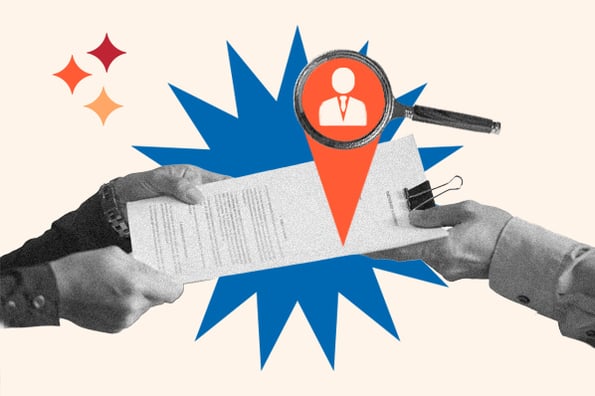
The truth is, you can't really predict on a case-by-case basis — and you're better safe than sorry. For the most part, having a cover letter will give you an upper hand in ways your resume doesn't. It allows you to show off your writing skills, provide details that you couldn't fit on your resume, demonstrate your passion, and show your willingness to put in as much time and effort as possible.
![future job openings cover letter → Click here to access 5 free cover letter templates [Free Download]](https://no-cache.hubspot.com/cta/default/53/3f347702-d7e9-4e59-9fe4-be4cd7bad191.png)
If you’ve ever rolled your eyes or balked at an application that required a cover letter, this guide is for you. We’ll go over how to write a cover letter and provide cover letter templates to help you perfect your own.
Application Letter
An application letter is a written document addressed to an employer by a job applicant, explaining why they're interested in and qualified for an open position. More commonly known as a cover letter, this document can come in the form of an email, MS Word document, or similar application template offered by the employer.
Seems fairly basic, right? Cover letters can hold different levels of importance to an employer depending on the industry you're in and the job you're applying for. According to a CareerBuilder survey, 49% of recruiters say sendign a cover letter along with your resume boosts your chance of landing the role.
If you do plan to write a cover letter, keep in mind there are certain qualities it should have that are not included in the definition above.
.png)
5 Free Cover Letter Templates
Five fill-in-the-blank cover letter templates to help you impress recruiters.
- Standard Cover Letter Template
- Entry-Level Cover Letter Template
- Data-Driven Cover Letter Template
You're all set!
Click this link to access this resource at any time.
What to Include in a Cover Letter
So, what should you include? We'll let the 11 templates below this list do most of the talking. No matter which one you download, pay attention to the following elements — all of which should shine through in the letter you send to your future manager.
Fill out this form to access your templates.
1. contact information.
Cover letters shouldn't just carry your contact information, but also that of the company to which you're applying. Contact info includes your phone number, email address, and any social media accounts you're willing to share and receive connections to.
Home addresses aren't required, but they can be a helpful reassurance to the employer that you already live nearby and would have no trouble coming into the office.
Avoid offering phone numbers, email addresses, or actual addresses that belong to your current employer. Using your personal Gmail address over your work email, for example, ensures your correspondence with recruiters remains separate from all of your current work communication.
2. A Personal Address Line
For as often as you see "to whom it may concern" at the top of cover letters today, do your best to avoid writing this exhausted line.
Address lines that specify a person or company grab your reader's attention much more quickly, and show the employer that you've taken the time to tailor your application letter to them. Don't have the name of the hiring manager? "Employers at [company name]" will do just fine.
A "hook" is a clever introduction that "hooks" your reader into wanting to learn more. Think about yourself as a job candidate — what makes you unique? What about your career might a recruiter be intrigued by that you can package into an interesting first sentence?
4. Why You're Qualified
It's a no-brainer that you should summarize your professional experience in your cover letter. However, today's best applications describe why this experience qualifies the applicant for the job they're applying for. For example, don't just state that you spent three years writing for a company blog. Explain that this type of work lends itself to managing your new potential employer's content calendar every week.
5. General Knowledge of the Business
Grammatical errors could mean your application is thrown in the trash, but that's not the only thing that could get your letter tossed aside. Using a generic "one-size-fits-all" cover letter — especially if you forget to change the name of the company — will also hurt your chances of landing an interview.
So, if you take the time to write a cover letter, take the time to comment on the business itself. Why are you applying to this company? What about their business stuck out to you as a professional?
Now, let's take a look at an example cover letter , what makes it effective, along with 11 templates you can download or draw inspiration from.
Cover Letter Example
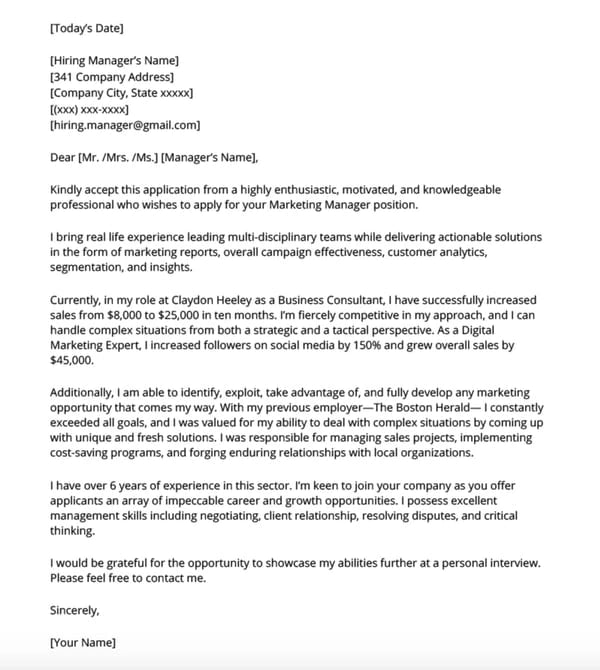
Image Source
The example above illustrates how to write a marketing cover letter using the elements we listed.
Besides the contact information and the address line, the first few paragraphs explain why the candidate is qualified for the position. This example uses specific data to show why they would be a good fit.
Additionally, in the second to last paragraph, the candidate discusses why they're interested in the specific company, demonstrating general knowledge of the business.
By combining all the elements to a cover letter, this is a great example to use for inspiration.
Featured Resource: 5 Professional Cover Letter Templates
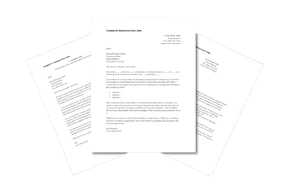
14 Free Cover Letter Templates for Your Next Job Application
Template 1: basic.
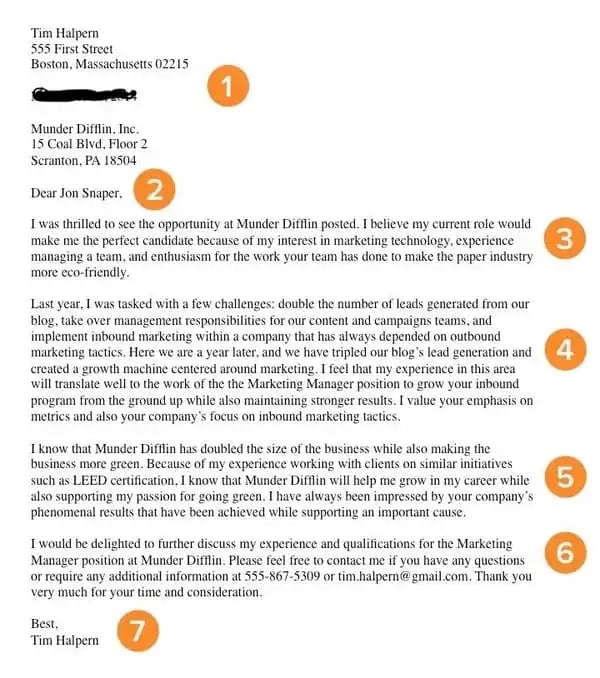
The example above is a basic (but great) cover letter. The numbered sections are explained in more detail below.
The level of formality your header has will depend on the company to which you apply. If you're applying to a formal business, it's important to use a formal header to open your cover letter, like in the sample above. Put your address, the date, and the company's address. But if you're applying to a company that isn't as formal, you don't need to include yours and the company's addresses. You can still include the date, though.
2. Greeting
Using "To Whom It May Concern" is okay, but you may want to take the time to research the name of the recruiter or hiring manager online. If you do your research and aren't confident you found the right name, then you should definitely use the generic greeting — but if you are sure, then it shows you put in the effort to find their name and it will catch the recruiter's eye.
If you have the recruiter's name, do you greet them by their full name, or by their courtesy title (i.e. Mr., Ms., or Mrs.)? Similar to the header, it depends on the company's level of formality. If you're applying to a corporate business, you may want to consider using "Mr. Snaper" instead of "Jon Snaper." If you're applying to a start-up or a business with a more casual culture, you can use "Jon Snaper," as shown in the example.
3. Introduction
Your opening paragraph should, in 1-3 sentences, state why you're excited to apply and what makes you the perfect candidate. Get right to the point, and don't worry about explaining where you found the posting or who you know at the company. This isn't a place to go into detail about why you're a great candidate — that's for the second paragraph. Here, simply list a few key reasons in one sentence to set up the rest of your letter. Keep in mind that the recruiter may cross-reference your cover letter with your resume, so make sure the two sync up.
4. Paragraph 2: Why You're a Great Fit for the Job
Next, sell yourself and your experience by choosing one or two concrete examples that show why you're a great fit for the position. What did you do at a previous company that gave you relevant experience? Which projects have you worked on that would benefit the new company? How will your prior experience help this company grow? Stay humble in your explanation of credentials while still showing that you would be an asset to the team. Use this paragraph to show you're genuinely excited and interested in the position.
5. Third Paragraph: Why the Company Is a Great Fit for You
While it's certainly important you're a good fit for the job, it's also important that the company is a good fit for you. "A cover letter typically describes why you're great for a company — but how will you benefit from getting hired?" asks former HubSpot Team Development Manager Emily MacIntyre . "We want to know why our company appeals to you, and how it will be a mutually beneficial working relationship."
In the third paragraph, show you're serious about growing and developing your career at this new company. What impresses and excites you about the company? Is there something that you feel strongly about that aligns with the company's goals? For example, the candidate in the sample letter used this space to show his personal commitment to environmental causes aligns with the company's green initiatives.
6. Strong Closer and Signature
Don't get lazy in the final few sentences of your cover letter — it's important to finish strong. Be straightforward about your interest and enthusiasm about the new position, and tell them you're available to talk about the opportunity at any time. Be sure to include your phone number and email address. At this point, the ball is (rightly) in the recruiter's court to decide how to follow up.
Last but certainly not least, thank them for their time and consideration. Use a formal sign-off like "Best," "All the best," or "Sincerely," and finish by typing out your full name. You don't need to sign it with a pen.
Template 2: Data-Driven Marketing Cover Letter
Get it here..
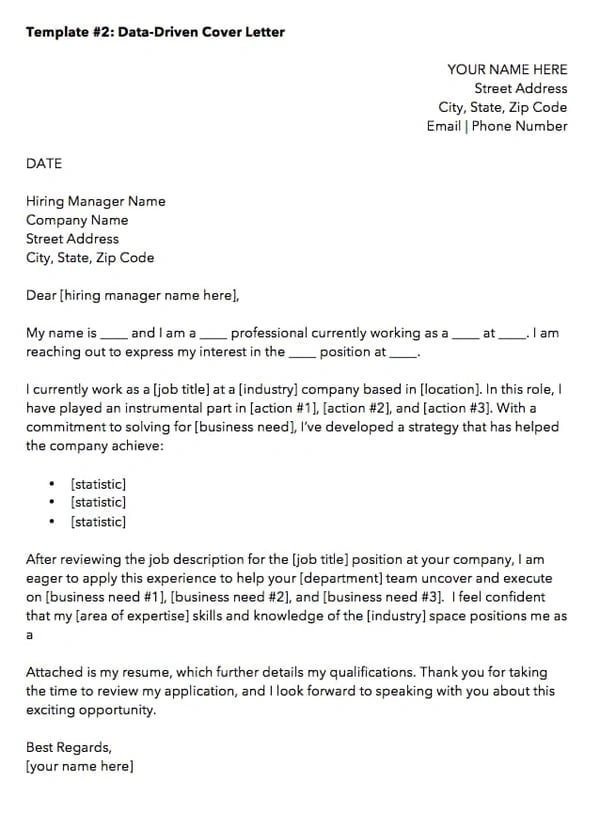
When applying to a data-driven position, it might be tempting to inject your cover letter with, well, the data to describe what you've done for other employers. But in an application letter — particularly for the marketing industry — how you convey this data is just as important as the data itself.
The cover letter template above, which we created here at HubSpot, can help you present the data that's most important to you as a candidate such that it'll matter to your future employer.
Notice the three bullet points near the center of the letter above, preceded by the statement: "... I've developed a strategy that has helped the company achieve ..." This setup is important, because while you can add as many statistics as you want to this template, your data points should describe how your current/former business benefited from your work, rather than how you, yourself, benefited.
Template 3: Straight-to-the-Point Cover Letter
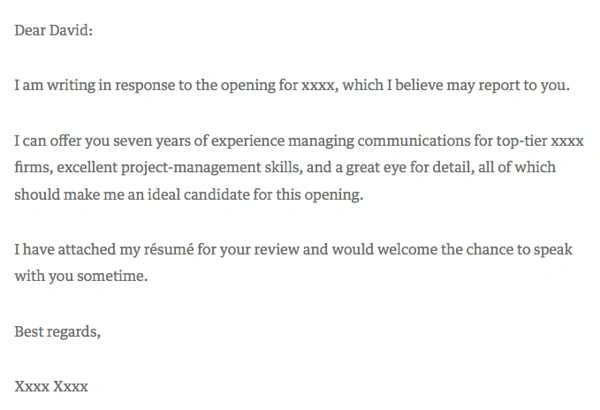
Harvard Business Review contributor David Silverman hailed the above cover letter example as "The Best Cover Letter I Ever Received." For context, Silverman believes there are only a handful of times when writing a cover letter is actually necessary:
- When you know the name of the hiring manager.
- When you know something about what the job requires.
- When you've been referred to the job personally.
Under those three circumstances, a straight-to-the-point cover letter like the one above could be your best bet. Because it's so concise, however, make a point to add your own letterhead above the message itself. It might be easy for a recruiter to sift through a short and sweet cover letter like the one above, but it's just as easy for it to get lost in the shuffle of their application list without a unique design or format.
Template 4: Referral Cover Letter
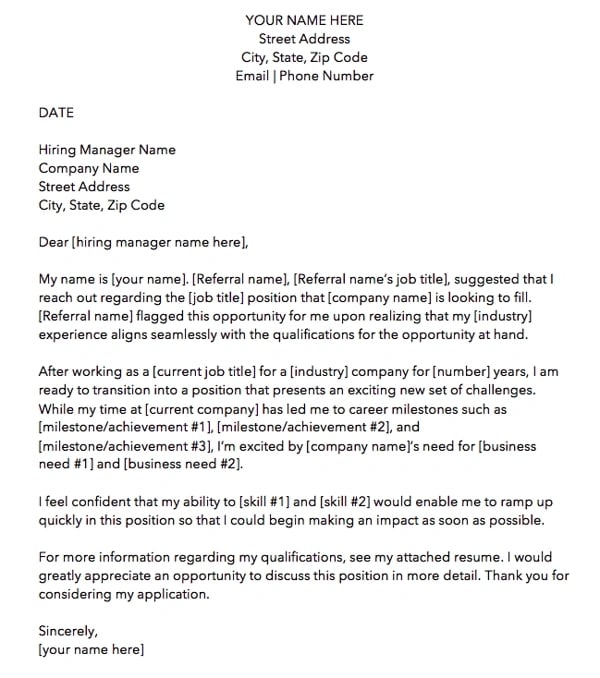
Just because a friend or colleague recommended you for a job doesn't mean the company is all set to hire you. Therefore, the cover letter template above is written specifically for referrals. We made this one here at HubSpot. Download it here (it comes with four other cover letter templates , too).
As you can see in the picture above, the first paragraph of the cover letter is dedicated entirely to acknowledging the circumstances of your applying: You know someone who works there — no harm in that. But there might be harm in not mentioning it to the hiring manager. Telling the reader about your connection at the company shows you're aware and confident of the actions you take to get the opportunities you're interested in.
Ultimately, it's better than the recruiter hearing about your employee connection from somebody else.
As for the rest of the cover letter, treat your message the same way you would if you had applied with no connection from within. Your skills and successes are no less important because of your internal referral.
Template 5: Photo Letterhead Cover Letter
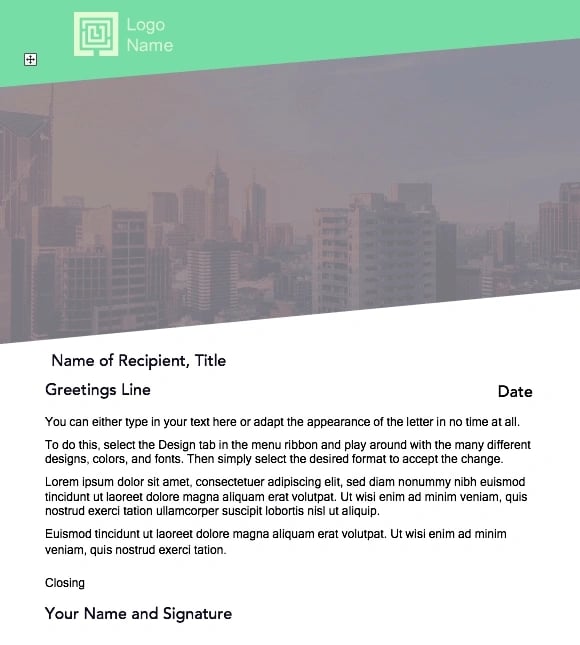
The cover letter template above was designed by Microsoft Office, and as comprehensive as it looks, it's completely free to download and modify.
As it looks right now, this cover letter contains about half photo, half text. Feel free to shrink (and change) the image to give yourself more room to tell your story. Of course, a nice washed-out image that expresses who you are can be part of that story ...
Template 6: Digital Creative Cover Letter
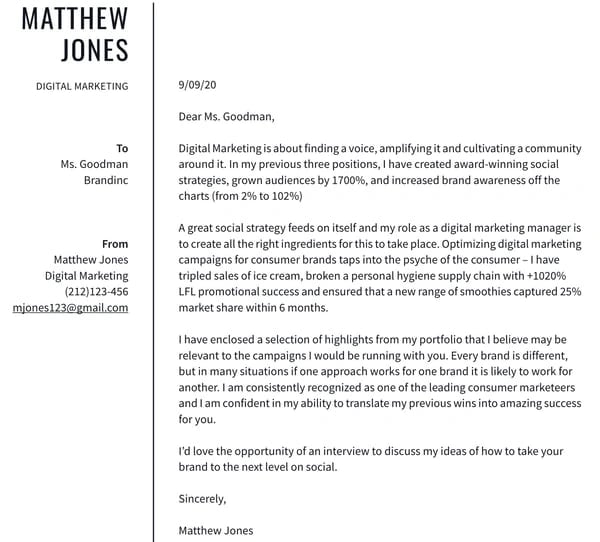
This sixth template is perfect for the applicant who wants to emphasize the many different digital channels they areon. This template goes well with a resume of the same format.
As you personalize this letter with your own experience, make note of the social networks and industry software included in this template. You'll see there’s additional space along the top to add your LinkedIn and personal website to fill with your own information.
You can improve upon this template by formatting your most important highlights and accomplishments with bullet points. This will make the document easier to read for the hiring manager and emphasizes the value you provide.
Template 7: Marketing Manager Cover Letter
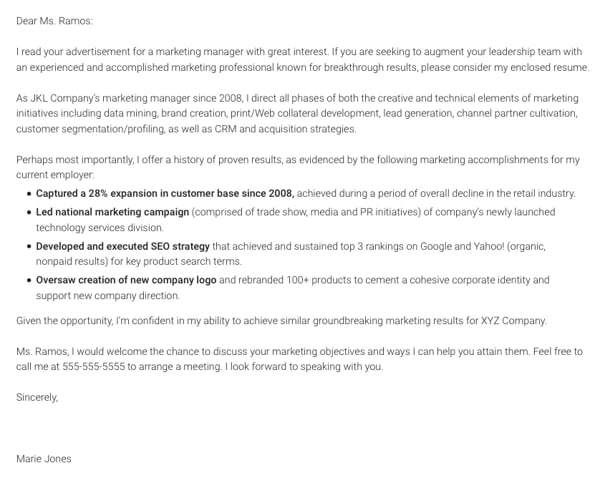
Our seventh cover letter comes from Monster.com. This cover letter, shown above, is focused specifically on a marketing role.
Notice how the writer includes references to important marketing metrics and terminology. If you're applying to a data-driven role, you might not want to fill the page with a story of your experience in paragraph form, like Template 1 does at the beginning of this article. Instead, consider highlighting three (or four, or five) of your successes that you believe the hiring manager would resonate most with, in bulleted form.
As a marketing professional, breaking up your letter with bulleted details like the ones above shows a respect for the hiring manager's limited time — a mentality that all marketers must understand when communicating with a brand's audience.
Template 8: Career Day Follow-Up Cover Letter
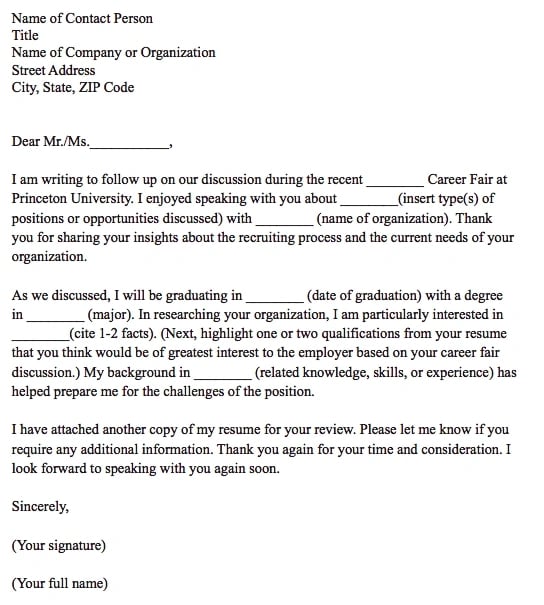
This is a unique kind of cover letter from Princeton University.
LinkedIn, Glassdoor, Monster, and Indeed might take the lion's share of your job searches online, but still some employment opportunities come out of a trade show, job fair, or similar networking event. For those occurrences, you have the follow-up cover letter template above.
This cover letter has everything you need to help an employer recall a conversation you had with him/her at a career fair. As you can see in the second paragraph, the letter is particularly useful to people who are about to graduate college.
Template 9: Logo and Watermarked Cover Letter
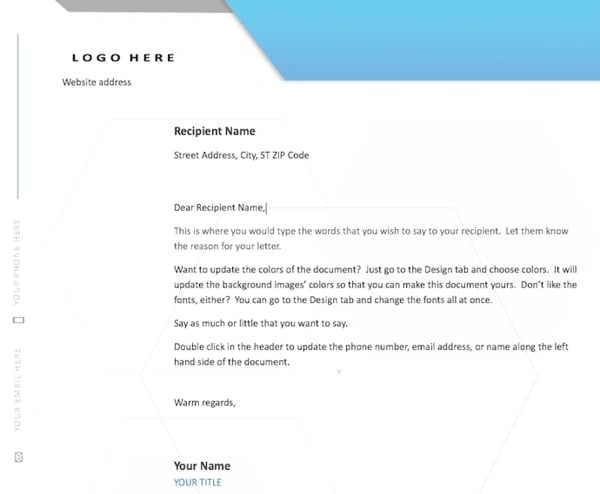
Here's another cover letter template from Microsoft Office. This one has a light touch of color in the design just above the letterhead, but make no mistake — the template caters to any professional looking to make a good first impression on their future employer.
Don't let the logo space on the top-right of the page confuse you. This can be the logo of the company to which you're applying — to quickly get the attention of the recruiter — or your own logo. Perhaps you freelance on the side or simply like branding yourself. This cover letter template is meant for customization.
Template 10: Data Scientist Cover Letter
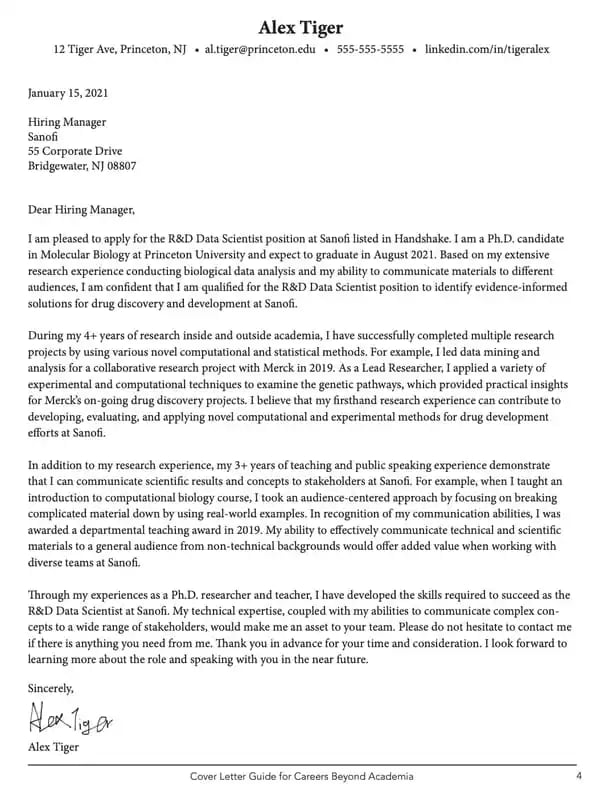
This is our second template from Princeton University. While this is focused on a data scientist role, it is an excellent template to use for students applying to jobs prior to graduation.
The text emphasizes how the applicant’s academic research and projects makes them an ideal candidate for the position. The format is also simple enough to submit as a pdf, as text in an email message or an application text box.
Template 11: Business Cover Letter
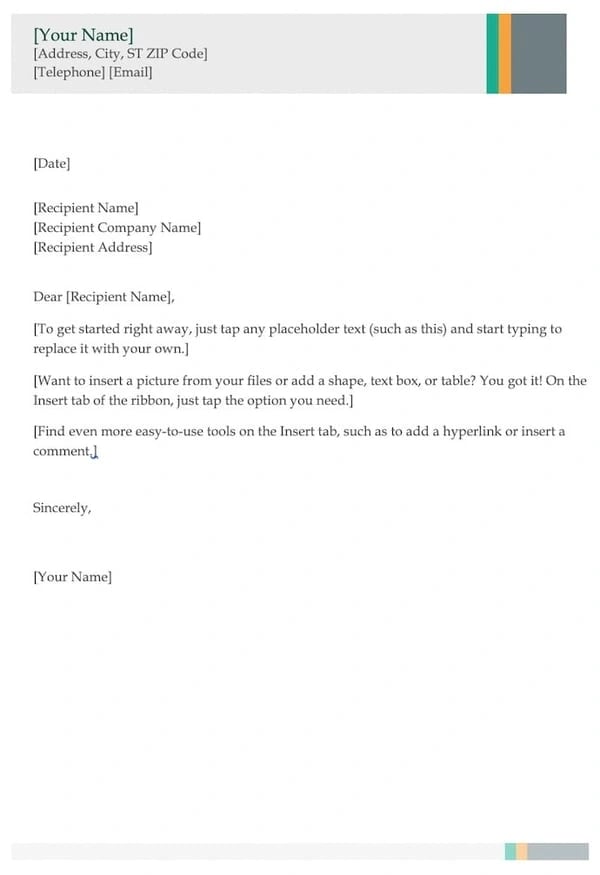
The cover letter template above is perfect for entry- and mid-level marketers who want to show a little extra professionalism in their opening note to a potential employer.
The multi-colored header (you can change the color if you wish) shows just the right amount of creativity and can go quite well with a resume of the same style. If you don't have enough experience to fill the entire page, don't worry. Feel free to write to a length you think is representative of who you are and what the hiring manager wants to see.
No matter how long your final cover letter is, the above template is your opportunity to show your attention to detail — from your contact information in the top header, to the personalized address line where you can include the name of the hiring manager. Like we said, "to whom it may concern" is pretty outdated, anyway.
Template 12: Entry-Level Cover Letter
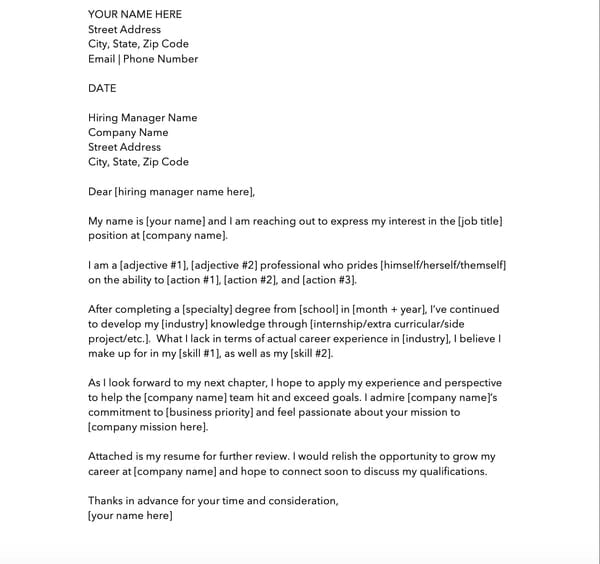
The cover letter template above, written by HubSpot, is specifically designed for entry-level applicants.
When you only have a few years experience, it's important to display how you gained your skills and what you learned from your education or internships. Additionally, it's important to mention why you want to work at the company you're applying to.
No matter your experience, the template above will help you decide what skills you want to highlight and flesh out in your cover letter.
You can download it here (it comes with four other cover letter templates , too).
Template 13: Healthcare Cover Letter
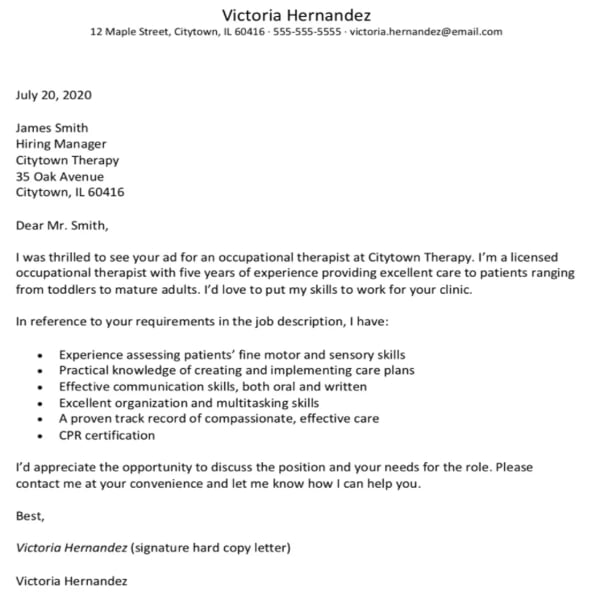
Additionally, phrases like "I'd love to put my skills to work for your clinic" and "Please contact me at your convenience and let me know how I can help you" focus on what the business will gain as a result of hiring the applicant, rather than what the applicant is looking to gain.
Template 14: Freelance Cover Letter
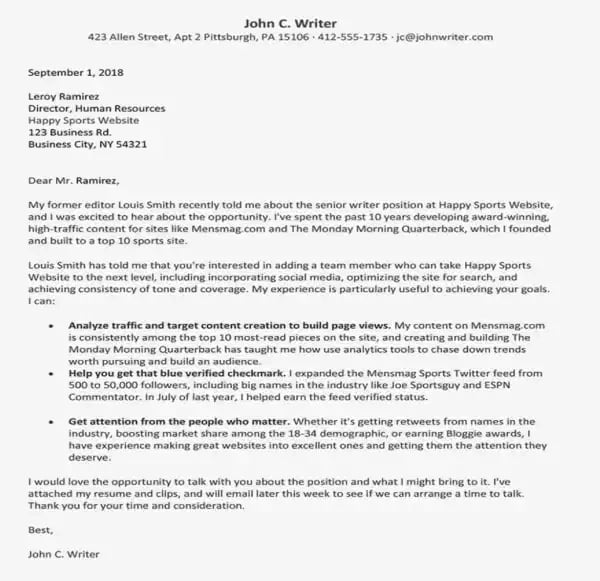
If you're looking for freelance work, your biggest goal is to get your strengths across quickly, so busy clients won't pass by your cover letter entirely. Additionally, if you're sending out multiple cover letters to different clients, you'll want to target each one to that client's unique goals.
For instance, if one client is looking for SEO-optimized content related to marketing, you'll want to highlight past experience writing marketing content; this will change if, for instance, the client is looking for fitness content.
For this reason, it's a good idea to structure your cover letter so you start with a) past credentials or references, and b) bullet-point information related to the client's goal, as shown in the cover letter above.
Template 15: Director Cover Letter
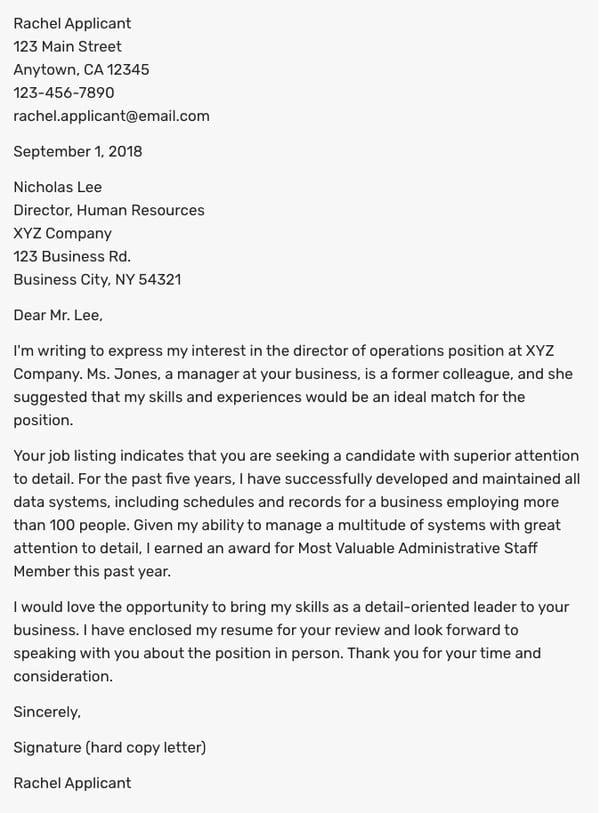
In the cover letter above, the candidate does a good job outlining how she succeeded in a leadership role previously: "For the past five years, I have successfully developed and maintained all data systems, including schedules and records for a business employing more than 100 people."
You'll want to demonstrate how your skills align with a Director position — both through organization and leadership — and, when possible, where you received recognition for your hard work (i.e. "I earned an award for Most Valuable Administrative Staff Member").
Write a Winning Cover Letter
Writing a cover letter is easier said than done. Don't hesitate to spend a lot of time writing and editing it. Tap into the incredible potential of AI tools, such as the HubSpot paragraph rewriter , to infuse each paragraph with a flawless touch of excellence. Or, ask a friend or family member to read it over and give you feedback. If the recruiter does end up reading it, you'll be thankful you did.
Editor's note: This post was originally published in November 2014 and has been updated for comprehensiveness.

Don't forget to share this post!
Related articles.

Is a Cover Letter Necessary in 2024?

The 23 Best Cover Letter Examples: What They Got Right
![future job openings cover letter How to Write a Cover Letter for an Internship [Examples & Template]](https://blog.hubspot.com/hubfs/Copy%20of%20Featured%20Image%20Template%20Backgrounds-Aug-21-2023-02-03-52-3390-PM.png)
How to Write a Cover Letter for an Internship [Examples & Template]
![future job openings cover letter Letter of Interest Tips, Templates & Examples [A 2023 Guide]](https://blog.hubspot.com/hubfs/letter%20of%20interest.png)
Letter of Interest Tips, Templates & Examples [A 2023 Guide]

The Ultimate Guide to Writing a Cover Letter
![future job openings cover letter How to Start a Cover Letter to Impress Employers [+ 14 Examples]](https://blog.hubspot.com/hubfs/how-to-start-a-cover-letter.jpg)
How to Start a Cover Letter to Impress Employers [+ 14 Examples]

Eight Cover Letter Greetings for Every Situation

7 Expert Cover Letter Tips to Get the Job
Marketing software that helps you drive revenue, save time and resources, and measure and optimize your investments — all on one easy-to-use platform
- Search Search Please fill out this field.
- Career Planning
- Finding a Job
- Cover Letters
How to Write a Cover Letter for an Unadvertised Job
Cover Letter Sample and Writing Tips for a Job That's Not Advertised
:max_bytes(150000):strip_icc():format(webp)/ADHeadshot-Cropped-b80e40469d5b4852a68f94ad69d6e8bd.jpg)
- Tips for Writing Your Cover Letter
What to Include in Your Cover Letter
- Cover Letter Example and Template
Proofread Your Documents
How to send your letter.
- How to Send Your Resume
Shapecharge / E+ / Getty Images
Not all companies advertise job openings. Some companies get plenty of applicants without advertising. Other companies may not be in hiring mode but will consider applications from qualified candidates if they anticipate an opening in the near future.
Sending a resume and cover letter to an employer, even though you aren't sure if there are available jobs, is a way to get your candidacy noticed. It may also get you advance consideration for positions that have just opened up. If you have skills the company is in need of, it may even get you considered for a brand-new position.
When you know an employer has an opening, don't hesitate to apply.
If you have a company you'd love to work for , consider taking the time to reach out and connect regardless of whether the organization is currently hiring.
Tips for Writing a Cover Letter for an Unadvertised Job
What's the best way to apply for unadvertised job openings? It depends on whether you know there is a position available, but the company hasn't listed it, or if there's a company you want to work for and you don't know if there are open jobs.
Kelly Miller / The Balance
When You Know There is a Job Opening
If you know the company is hiring but hasn't advertised the position, write a traditional cover letter expressing your interest in the open position at the company. Be sure to specifically relate your qualifications for the job.
When You Don't Know if the Company is Hiring
Writing a cover letter for an unadvertised opening (also known as a cold contact cover letter or letter of interest ) is a little different than writing a cover letter for a job that you know is available.
With this type of letter, you will need to make a strong pitch for yourself and how you can help the company. Below are some tips on how to write a cover letter for an unadvertised opening.
- Mention your contacts. If you know someone at the organization, mention this at the beginning of the cover letter. Having a contact at the company is a great way to get your foot in the door, even if the company isn’t actively hiring.
- Use paper or email. You can send your letter via paper or email . Sending an old-fashioned paper letter works well for this type of letter , because it may have a better chance of being read than an email, which could be deleted without even being opened.
- Include a resume. Whether you send your cover letter via paper or email, be sure to include a copy of your resume. Make sure you tailor your resume to the company and the type of job you are looking for.
Below is detailed information on what to include in your cover letter, along with links to example cover letters.
Your Contact Information Name Address City, State Zip Code Phone Number Email Address
- Cover Letter Contact Section Examples
Greeting If you can find a contact person at the company, direct your letter or email message to them. Here's how to find contacts at companies .
If you can't locate a contact person, address your letter to "Dear Hiring Manager" or leave out this section and start with the first paragraph of your letter.
- Cover Letter Greeting Examples
Body of Cover Letter The goal of your letter is to get noticed as a prospective employee even if the company isn't hiring immediately. Your letter should explain the reason for your interest in the organization, and identify your most relevant skills or experiences and explain why you would be an asset to the company.
First Paragraph: The first paragraph of your letter should include information on why you are writing. If you know someone at the company, mention it now. Be specific as to why you are interested in this particular company.
Middle Paragraph(s): The next section of your cover letter should describe what you have to offer the employer. Again, be specific as to how you can help the organization.
Final Paragraph: Conclude your cover letter by thanking the employer for considering you for employment.
- What to Include in the Body Section of a Cover Letter
Closing Best Regards, (or choose another closing from the examples below)
- Cover Letter Closing Examples
Signature Handwritten Signature (for a mailed letter)
Typed Signature When you are sending an email letter, be sure to include all your contact information in your signature.
- Signature Examples
Cover Letter Example for a Job That's Not Advertised
You can use this sample as a model to write a cover letter. Download the template (compatible with Google Docs and Word Online), or read the text version below.
Cover Letter for a Job That's Not Advertised (Text Version)
Your Name Your Address City, State Zip Code Your Phone Number Your Email Address
Contact Name Title Company Address City, State Zip Code
Dear Mr./Ms. LastName,
As an Information Technology professional with high-level management experience in the IT industry, I learned that the best way to achieve success was to motivate the resources I had with well-defined objectives and empowerment.
A management belief based on integrity, quality, and service, along with a positive attitude, an aptitude for strategic thought and planning, and the ability to adapt quickly to new ideas and situations allows me to achieve consistent and significant successes in multiple industries.
My personality profile says:
- A confident, driven individual who reacts quickly to change.
- A self-starter with a strong sense of urgency who responds positively to challenge and pressure.
- A fast learner who is a practical and ingenious problem solver.
- A fluent and articulate communicator, flexible and responsive. A self-directed, goal-oriented doer.
My former managers' say:
"…The Information Technology Analysis will serve as a guideline for making positive contributions …your management style provided a footprint for younger members of our organization… a very positive impression of the contributions you made to our business and its growth." Gregory Hines, President and CEO, Information Data Technology.
"…the most important source of growth in our data technology business …able to focus the team and manage the product to a successful introduction …due in large part to his own personal commitment ...excellent IT project management and operational management skills." Pauline Hallenback, CTO at Information Systems.
"…your strengths as a manager are many and varied …all issues are confronted in a timely manner …management by objectives comes as a second nature to you…" Jackson Brownell, Director of Operations, Denver Technologies.
ABC Company is a company that would provide me with the opportunity to put my personality, skills, and successes to work. At a personal meeting, I would like to discuss with you how I will contribute to the continued growth of your company.
Best regards,
Carefully proofread both your resume and cover letter before you send them. Here are proofreading tips for job seekers.
When sending your letter via email, write your letter in the email message and attach your resume to the message. In the subject line, put your name and the reason for writing (Your Name - Introduction).
- Email Subject Lines
How to Send Your Resume With Your Cover Letter
Here's how to send your resume with your cover letter:
- How to Email Your Resume
- How to Send Your Resume as an Attachment
- How to Mail a Resume and Cover Letter
Key Takeaways
TAKE INITIATIVE: Not all companies immediately advertise opening positions. Taking the initiative to send a cover letter of introduction “on spec” may garner you an interview for either an existing or a newly developed job role.
APPLY TO YOUR DREAM COMPANY: Nothing ventured, nothing gained. If there is a company you’ve always wanted to work for, reach out to their hiring department with a strategic letter that presents your qualifications and interest in their organization.
BUILD UPON YOUR CONTACTS: A good way to get your foot into the door at a company is to begin your letter of introduction by mentioning the contacts you know who work there. Take this to the next level by proactively asking these contacts – before you send your cover letter – if they would be willing to put in a good word on your behalf with their employer.
How to Write a Cover Letter in 2024 + Examples

After weeks of heavy job search, you’re almost there!
You’ve perfected your resume.
You’ve short-listed the coolest jobs you want to apply for.
You’ve even had a friend train you for every single interview question out there.
But then, before you can send your application and call it a day, you remember that the job ad requires a cover letter.
Now you’re stuck wondering how to write a cover letter ...
Don’t panic! We’ve got you covered. Writing a cover letter is a lot simpler than you might think.
In this guide, we’re going to teach you how to write a cover letter that gets you the job you deserve.
- What’s a cover letter & why it’s important for your job search
- How to write a convincing cover letter that gets you the job (step-by-step!)
- How to perfect your cover letter with the Novoresume free checklist
- What excellent cover letter examples look like
New to cover letter writing? Give our resumes 101 video a watch before diving into the article!
So, let’s get started with the basics!
What is a Cover Letter? (and Why It’s Important)
A cover letter is a one-page document that you submit as part of your job application (alongside your CV or Resume).
Its purpose is to introduce you and briefly summarize your professional background. On average, your cover letter should be from 250 to 400 words long .
A good cover letter can spark the HR manager’s interest and get them to read your resume.
A bad cover letter, on the other hand, might mean that your application is going directly to the paper shredder. So, to make sure this doesn’t happen, it’s essential to know how to write a convincing cover letter.
How does a good cover letter look, you might ask. Well, here’s an example:

Keep in mind, though, that a cover letter is a supplement to your resume, not a replacement. Meaning, you don’t just repeat whatever is mentioned in your resume.
If you’re writing a cover letter for the first time, writing all this might seem pretty tough. After all, you’re probably not a professional writer.
The thing is, though, you don’t need to be creative, or even any good at writing. All you have to do is follow a tried-and-tested format:
- Header - Input contact information
- Greeting the hiring manager
- Opening paragraph - Grab the reader’s attention with 2-3 of your top achievements
- Second paragraph - Explain why you’re the perfect candidate for the job
- Third paragraph - Explain why you’re a good match for the company
- Formal closing
Or, here’s what this looks like in practice:

How to Write the Perfect Cover Letter (And Get Hired!)
Now that we’ve got the basics out of the way, we’re going to guide you through the process of writing a cover letter step by step.
Step #1 - Pick the Right Cover Letter Template
A good cover letter is all about leaving the right first impression.
So, what’s a better way to leave a good impression than a well-formatted, visual template?

You can simply pick one of our hand-picked cover letter templates , and you’ll be all set in a jiffy!
As a bonus, our AI will even give you suggestions on how to improve your cover letter on the go.
Step #2 - Start the Cover Letter with a Header
As with a resume, it’s important to start your cover letter with a Contact Information section:

Here, you want to include all essential information, including:
- Phone Number
- Name of the hiring manager / their professional title
- Name of the company you’re applying to
In certain cases, you might also consider adding:
- Social Media Profiles - Any type of profile that’s relevant to your field. Social Profiles on websites like LinkedIn, GitHub (for developers), Medium (for writers), etc.
- Personal Website - If you have a personal website that somehow adds value to your application, you can mention it. Let’s say you’re a professional writer. In that case, you’d want to link to your blog.
And here’s what you shouldn’t mention in your header:
- Your Full Address
- Unprofessional Email - Make sure your email is presentable. It’s pretty hard for a hiring manager to take you seriously if your email address is “[email protected].” Whenever applying for jobs, stick to the “[first name] + [last name] @ email provider.com” format.

Step #3 - Greet the Hiring Manager
Once you’ve properly listed your contact information, you need to start writing the cover letter contents.
The first thing to do here is to address the cover letter to the hiring manager .
That’s right, the hiring manager! Not the overly popular “Dear Sir or Madam.” You want to show your future boss that you did your research and are really passionate about working with their team.
No one wants to hire a job seeker who just spams 20+ companies and hopes to get hired in any of them.
So, how do you find out who’s the hiring manager? There are several ways to do this.
The simplest option is to look up the head of the relevant department on LinkedIn. Let’s say you’re applying for the position of a Communication Specialist at Novoresume. The hiring manager is probably Head of Communications or Chief Communications Office.
So, you do a quick lookup on LinkedIn:

And voila! You have your hiring manager.
Or let’s say you’re applying for the position of a server. In that case, you’d be looking for the “restaurant manager.”
If this doesn’t work, you can also check out the “Team” page on the company website; there’s a good chance you’ll at least find the right person there.
Here are several other greetings you could use:
- Dear [Department] Hiring Manager
- Dear Hiring Manager
- To whom it may concern
- Dear [Department] Team
Step #4 - Write an Attention-Grabbing Introduction
First impressions matter, especially when it comes to your job search.
Recruiters get hundreds, sometimes even thousands, of applications. Chances are, they’re not going to be reading every single cover letter end-to-end.
So, it’s essential to catch their attention from the very first paragraph .
The #1 problem we see with most cover letter opening paragraphs is that they’re usually extremely generic. Most of them look something like this..
- Hey, my name is Jonathan and I’d like to work as a Sales Manager at XYZ Inc. I’ve worked as a sales manager at MadeUpCompany Inc. for 5+ years, so I believe that I’d be a good fit for the position.
See the issue here? This opening paragraph doesn’t say pretty much anything except the fact that you’ve worked the job before.
Do you know who else has similar work experience? All the other applicants you’re competing with.
Instead, you want to start off with 2-3 of your top achievements to really grab the reader’s attention. Preferably, the achievements should be as relevant as possible to the position.
So now, let’s make our previous example shine:
My name’s Michael and I’d like to help XYZ Inc. hit and exceed their sales goals as a Sales Manager. I’ve worked with Company X, a fin-tech company, for 3+ years. As a Sales Representative, I generated an average of $30,000+ in sales per month (beating the KPIs by around 40%). I believe that my previous industry experience, as well as excellence in sales, makes me the right candidate for the job.
See the difference between the two examples? If you were the hiring manager, which sales manager would you hire, Jonathan or Michael?
Now that we’ve covered the introduction, let’s talk about the body of your cover letter. This part is split into two paragraphs: the first is for explaining why you’re the perfect person for the job, and the latter is for proving that you’re a good fit for the company.
So, let’s get started...
Step #5 - Explain why you’re the perfect person for the job
This is where you show off your professional skills and convince the HR manager that you’re a better fit for the job than all the other applicants.
But first things first - before you even write anything, you need to learn what the most important requirements for the role are. So, open up the job ad and identify which of the responsibilities are the most critical.
For the sake of the example, let’s say you’re applying for the position of a Facebook Advertiser. You scan the job ad and see that the top requirements are:
- Experience managing a Facebook ad budget of $10,000+ / month
- Some skills in advertising on other platforms (Google Search + Twitter)
- Excellent copywriting skills
Now, in this section, you need to discuss how you fulfill these requirements. So, here’s how that would look for our example:
In my previous role as a Facebook Marketing Expert at XYZ Inc. I handled customer acquisition through ads, managing a monthly Facebook ad budget of $20,000+ . As the sole digital marketer at the company, I managed the ad creation & management process end-to-end. Meaning, I created the ad copy , images, picked the targeting, ran optimization trials, and so on.
Other than Facebook advertising, I’ve also delved into other online PPC channels, including:
- Google Search
Are you a student applying for your first internship? You probably don’t have a lot of work experience to show off in this section. Learn how to write an internship cover letter here.
Step #6 - Explain why you’re a good fit for the company
Once you’ve written the last paragraph, you might be thinking - I’m a shoo-in for the job! What else do I need to write? I’ll just wrap up the cover letter and hit that sweet SEND button.
Well, no. You’re not quite there yet.
The HR manager doesn’t only look at whether you’ll be good at the job or not. They’re looking for someone that’s also a good fit for the company culture.
After all, employees that don’t fit in are bound to quit, sooner or later. This ends up costing the company a ton of money, up to 50% of the employee’s annual salary .
Meaning, you also need to convince the HR manager that you’re really passionate about working with them.
How do you do this? Well, as a start, you want to do some research about the company. You want to know things like:
- What’s the company’s business model?
- What’s the company product or service? Have you used it?
- What’s the culture like? Will someone micro-manage your work, or will you have autonomy on how you get things done?
So, get to Googling. Chances are, you’ll find all the information you need either on the company website or somewhere around the web.
Then, you need to figure out what you like about the company and turn that into text.
Let’s say, for example, you’re passionate about their product and you like the culture of innovation / independent work in the organization.
You’d write something like:
I’ve personally used the XYZ Smartphone, and I believe that it’s the most innovative tech I’ve used in years. The features such as Made-Up-Feature #1 and Made-Up-Feature #2 were real game changers for the device.
I really admire how Company XYZ thrives for excellence for all its product lines, creating market-leading tech. As someone that thrives in a self-driven environment, I truly believe that I and Company XYZ will be a great match.
What you don’t want to do here is be super generic for the sake of having something to write. Most job seekers tend to mess this one up. Let’s take a look at a very common example we tend to see (way too often):
I’d love to work for Company XYZ because of its culture of innovation. I believe that since I’m super creative, I’d be a good fit for the company. The company values of integrity and transparency really vibe with me.
See what’s wrong here? The example doesn’t really say anything about the company. “Culture of Innovation” is something most companies claim to have.
The same goes for “values of integrity and transparency” - the writer just googled what the values for the organization are, and said that they like them.
Any hiring manager that reads this will see through the fluff.
So, make sure to do a lot of research and come up with good reasons why you're applying.
Step #7 - Wrap up with a call to action
Finally, it’s time to finish up your cover letter and write the conclusion.
In the final paragraph, you want to:
- Wrap up any points you couldn't in the previous paragraphs. Do you have anything left to say? Any other information that could help the hiring manager make their decision? Mention it here.
- Thank the hiring manager for their time. It never hurts to be courteous, as long as you don’t come off as too needy.
- Finish the cover letter with a call to action. The very last sentence in your cover letter should be a call to action. You should ask the hiring manager to take some sort of action.
And now, let’s turn this into a practical example:
So to wrap it all up, thanks for looking into my application. I hope I can help Company X make the most out of their Facebook marketing initiatives. I'd love to further discuss how my previous success at XYZ Inc. can help you achieve your facebook marketing goals.
Step #8 - Use the right formal closing
Once you’re done with the final paragraph, all you have to do is write down a formal “goodbye” and you’re good to go.
Feel free to use one of the most popular conclusions to a cover letter:
- Best Regards,
- Kind Regards,
And we’re finally done! Before sending off the cover letter, make sure to proofread it with software like Grammarly, or maybe even get a friend to review it for you.
Does your cover letter heading include all essential information?
- Professional email
- Relevant Social Media Profiles
Do you address the right person? I.e. hiring manager in the company / your future direct supervisor
Does your introductory paragraph grab the reader's attention?
- Did you mention 2-3 of your top achievements?
- Did you use numbers and facts to back up your experience?
Do you successfully convey that you’re the right pro for the job?
- Did you identify the core requirements?
- Did you successfully convey how your experiences help you fit the requirements perfectly?
Do you convince the hiring manager that you’re passionate about the company you’re applying to?
- Did you identify the top 3 things that you like about the company?
- Did you avoid generic reasons for explaining your interest in the company?
Did you finalize the conclusion with a call to action?
Did you use the right formal closure for the cover letter?
5+ Cover Letter Examples
Need some inspiration? Read on to learn about some of the best cover letter examples we’ve seen (for different fields).
College Student Cover Letter Example

Middle Management Cover Letter Example

Career Change Cover Letter Example

Management Cover Letter Example

Senior Executive Cover Letter Example

Want to discover more examples AND learn what makes them stand out? Check out our guide to cover letter examples .
Next Steps in Your Job Search - Creating a Killer Resume
Your cover letter is only as good as your resume. If either one is weak, your entire application is for naught.
After all, a cover letter is just an introduction. Imagine going through all this effort to leave an amazing first impression, but flopping at the end because of a mediocre resume.
...But don’t you worry, we’ve got you covered on that end, too.
If you want to learn more about Resumes & CVs, we have a dedicated FREE guide for that. Check out our complete guide on how to make a resume , as well as how to write a CV - our experts will teach you everything you need to know in order to land your dream job.
Or, if you’re already an expert, just pick one of our resume templates and get started.

Key Takeaways
Now that we’ve walked you through all the steps of writing a cover letter, let’s summarize everything we’ve learned:
- A cover letter is a 250 - 400 word document that convinces the hiring manager of your competence
- A cover letter goes in your job application alongside your resume
- Your introduction to the cover letter should grab the hiring manager’s attention and keep it all the way until the conclusion
- There are 2 main topics you need to include in your cover letter: why you’re the perfect candidate for the job & why you’re passionate about working in the company you’re applying to
- Most of the content of your cover letter should be factual , without any fluff or generalizations
At Novorésumé, we’re committed to helping you get the job you deserve, every step of the way! Follow our blog to stay up to date with the industry-leading advice. Or, check out some of our top guides…
- How to Write a Motivational Letter
- How to Write a Resume with No Work Experience
- Most Common Interview Questions and Answers

To provide a safer experience, the best content and great communication, we use cookies. Learn how we use them for non-authenticated users.
- How to Find a Job
- Building a Career Network
- Internships
- Volunteer Work

Creating Your Résumé
- Résumé Examples
Creating Your Cover Letter
Job interview tips.
- Planning for College
- College Planning Timeline
- Taking College Entrance Exams
- Testing Tips
- Choosing a College
- The College Application Process
- Campus Visit Tips
- Writing a College Essay
- College Interview Tips
- Paying for College
- Paying for Two-year Colleges & Trade Schools
- Financial Aid Application
- What to Bring to College
- Campus Life: What to Expect
- Types of Military Service
- Enlisting in the Military
- Becoming an Officer
- College Assistance
- Common Military Questions
- Preparing for Basic Training
- Military Benefits
- Military Life
- Glossary: Military Jargon
Every time you send out a résumé, you'll need to have a great cover letter to send along with it. It's a good idea to customize your cover letter for each job you're applying for. The cover letter is another way of introducing yourself to a potential employer. What it says about you can be the difference between getting in the door and missing your chance.
Jump to Section
- Before you write
- Recommended format
- Compose the letter
- Make your cover letter stand out
- Common mistakes
- Tips for emailing a cover letter
- Sample cover letter

Before You Write
Each cover letter takes preparation. Here are some things to keep in mind while you prepare:
- Think about yourself and your experiences. Then think about how you would like to relate these experiences to the organization you're writing to. Which of your talents, skills, personality traits and accomplishments should this particular organization know about? Brainstorm a list for yourself.
- How did you hear about this opportunity? If it was through a personal contact, write down the name. If through an advertisement, write down where and when you saw it and list the specific points the ad wants you to include.
- What do you know about the organization you're writing to? Consider what attracted you to it in the first place. Maybe it's personal (a friend worked there), or maybe you are impressed with what the organization does or admire their unique work philosophy. Do some research about the company online or through trade magazines, etc.
- To whom are you writing? It's always best to write to an actual person (with a title) if you can. If you're responding to an ad that does not include a specific contact, try to look up the name of someone related to the role. Be sure to spell both name and title perfectly. If you cannot find a specific person to write to, try "Dear Hiring Manager" or "Dear Human Resources."
Recommended Format
Busy people don't want to read long letters from people they don't know. The cover letter should be no more than one page long, written in standard business letter format. This means that you may indent your paragraphs or not—but not indenting gives a bit more room.
Leave wide margins (minimum 1 inch) and use a clean, simple font like Arial or Times New Roman. Don't use a tiny font just to fit everything on one page; 10- or 12-point type is best. Write clearly and avoid hyphenated words at the ends of lines.
Compose the Letter
- Paragraph One: Start with how you heard about the job—friend, employee, newsletter, advertisement, etc. This is especially important if you've been referred by a mutual friend or acquaintance. If this is the case, don't start with "My friend John Peterson told me you have a job opening so I thought I would write." This will not "wow" anyone. Instead, show a little excitement and passion for the potential employment: "I was thrilled when my friend John Peterson told me there was an opening for an assistant photographer at your company." Follow this with a few key strengths you have that are pertinent to the position you're looking to obtain.
- Paragraph Two: Here you should describe your qualifications for the job—skills, talents, accomplishments and personality traits. Don't go overboard; pick the top three talents or characteristics that would make you stand out as a candidate. (your résumé is there to fill in the details). When writing this paragraph, think about how and why your specific skills, talents and accomplishments would be best for the role.
- Paragraph Three: Describe why you'd be a good fit for the company. Maybe you like their fast growth, know people who work there already or you've always used their products. Companies feel good if the candidate has some connection to them and has a good understanding of how the company works, even before he or she is hired.
- Paragraph Four: Mention the enclosed résumé, give them a reason to read it in-depth (e.g., "For my complete employment history and applicable computer skills, please see the included résumé") and ask for an interview. Suggest a time and a way for you to follow up. Always give the reader easy ways to contact you.
- Proofread carefully. A single spelling, grammatical or factual mistake indicates carelessness to the employer and may disqualify you before your résumé has been reviewed. If spelling and grammar aren't your strong points, ask for help. Having a second pair of eyes proofread your résumé and cover letter can help you catch mistakes you may have missed.
- Write individual letters. Personalized communications are always the way to go, so take the time to tailor each letter to the organization and person to whom you're writing. Recruiters can easily recognize "stock" or "generic" letters, which send the message that you don't care enough to personalize your message.
- Forget photos. Unless you're an aspiring actor or model, don't enclose a photo. It gives the screener one more arbitrary reason not to call you for the interview.
- Use simple, clear sentences. Choose every word carefully. Constantly ask yourself, "Is there a way to say this more clearly?" and "Am I communicating my ideas to the best of my ability?"
- Save your résumé and cover letter in a place where you can find them easily. You'll need to have them handy when you follow up later.
Make Your Cover Letter Stand Out
- Be yourself. A "formula" approach is fine, but each letter should reflect your personality and your enthusiasm. Let them shine through. Take pride in who you are and what you've done. The reader is looking for a human being, a person who knows what he or she can offer and can express it well.
- Write in the active tense. Active verbs are the key when writing cover letters and résumés. Instead of saying, "My best attributes include team play and motivating people," say, "I'm a dedicated team player who can motivate people." The latter promises a go-getter employee—someone who can take action instead of waiting to be led by the hand.

Common Mistakes
- Writing to a department or title. It's always best to write to a real person with a real title. The exception to this is when you're answering an ad and specific contact information is not provided.
- Using "Dear Sir." Many cover letter readers are women. If you cannot get the name and title of someone to write to, it's safer to use either a job title or generic title like "Dear Human Resources Manager," or "Dear Sir/Ma'am."
- Overusing "I." It's okay to refer to yourself, but not in every sentence. Remember to use "you" even more. Show the "you" to whom you are writing that you're more concerned with meeting his or her needs than meeting your own.
- Exaggerating your experience. Don't "stretch" anything you say. Be completely truthful while still presenting yourself in the best possible light.
- Forgetting to give the employer a way to contact you. Never forget to include your phone number or email address or both. How will the employer let you know about your upcoming interview if he or she can't call and tell you about it?
- Forgetting to sign the letter or to attach your résumé.
Tips for Emailing a Cover Letter
Unless you’re submitting your résumé and cover letter on a job submission website, chances are the employer has asked that you email your application directly. In that case, you can either attach your cover letter as a PDF to the email as you would your résumé, or you can include your cover letter in the body of the email. Other things to keep in mind:
- Make the most of an email subject line. Don't just leave the subject line blank or insert a job number unless that's what you're instructed to do. Use the subject line to sell yourself. For example, if you're applying for a sales position, in your subject line say something like "Experienced Salesperson for Executive Sales Position."
- Use plain styling. While some email allows special formatting, many will not recognize specialized text, bullets, tabs, boldface text or formatted text.
- Remove the contact's address. If your cover letter becomes the body of the email, you can skip the formality of including the contact's mailing address.
- Email your cover letter to a friend before sending it to your employer. This will give you an opportunity to make sure the formatting and content look OK on the receiving end.
- Maintain a professional tone. Remember that this is not an email to your friend or family member. Avoid using abbreviations, slang, wild colors, emoticons (happy faces, hearts, etc.) or inspirational quotes as part of your signature or any other everyday email features.
Sample Cover Letter
September 12, 2018
John D. Smith
Human Resources Manager
Mom's Marmalades, Inc.
123 Main Street
New York, NY 10000
Dear Mr. Smith:
I was thrilled when Tom Townsend, a mutual friend, suggested I write to you about opportunities at Mom's Marmalades. As a self-starter who's already had some strong experience as an entrepreneur, I'm interested in a marketing internship with your company.
I am hardworking and analytical and I like taking initiative. In the past year I have accomplished a lot:
- Received one of only three prizes in school science fair
- Worked weekends two years straight as a telephone call center representative
- Managed a small online bookstore that grossed over $600 in sales in four months
I've always believed in the quality of your jams and have enjoyed them since I was seven years old. I would love to be a part of the specialty foods business, especially at Mom's Marmalades.
Enclosed, please find a copy of my résumé. I will give you a call next week to see if we could set up a time to discuss my becoming a part of your company for the summer. Feel free to call me at (212) 555-5555 or send email to [email protected].
I look forward to speaking with you soon.
(Signature)
Joe P. Higgins
Related Resources
Follow this step-by-step guide to creating this important document.
Find out what to do before, during and after your interview.
- Resume Templates
- Resume Examples
- Free Resume Builder
- How to Write a Resume
- Resume Format
- Resume Packs
- Cover Letter Templates
- Cover Letter Examples
- Free Cover Letter Generator
- How To Write a Cover Letter
- CV Templates
- CV Examples
- Free CV Maker
- Resume Help
- Cover Letter Help
- Job Interview
- Career Advice
Best Cover Letter Examples To Nail Your Next Job Application
Create personalized cover letters for every job in minutes, not hours.
A cover letter is overrated….said no HR person ever.
On the contrary, most treat a cover letter as a powerful add-on to a resume. Yes, even if it’s marked as *optional*.
Candidates who bother to write a cover letter (vs those who don’t) instantly appear more motivated and professional. Moreover, they establish a better rapport with the hiring authorities before even walking through the door.
Why? Because a cover letter gives you an opportunity to contextualize the qualifications and competencies you’re bringing up on your resume. Remember: You’re competing against other qualified people with very similar skill sets. A cover letter gives you an opportunity to show how you’re using your expertise in real-world settings, plus talk a bit further about your soft skills and passion for the selected profession.
When combined with a resume, your cover letter helps the employer get a wholesome picture of you as a candidate — and ring you up for a job interview.
Cover Letter Examples by Profession and Industry
If you’re tired of browsing generic cover letters which are clearly out of touch with the modern reality of work, you’ve landed at the right place. Freesumes runs an up-to-date database of sample cover letters, created and vetted by certified writers and HR experts.
Sample Cover Letters for Entry-Level Jobs
A compelling cover letter for a first job is as important as your resume. Learn how to talk your way into getting that job when you lack extensive work experience.
Entry-Level
Short Samples
Recent Graduate
Research Internship
Cover Letter Examples for Teachers and Educators
Academia and education favor good writing. Use our samples as prompts to build a strong case of why you’d make a strong addition to the faculty.
Substitute Teacher
Library Assistant
Admissions Counselor
Assistant Principal
Retail & Sales Cover Letter Examples
Show your abilities to persuade in writing by following our expert-level cover letter writing strategies for positions in sales and retail.
Store Manager
Cover Letter Examples for Healthcare
Put your emotional intelligence and well-rounded people skills upfront. Healthcare is a sector where hard and soft skills are equally valued.
Social Worker
Medical Assistant
Veterinarian Assistant
Administrative & Management Cover Letter Examples
Orchestrate a memorable first impression with a cover letter that shows how perfectly you’d fit into any position requiring strong organizational and (self)-management skills.
Receptionist
Administrative Assistant
Financial Analyst
Executive Assistant
Legal Assistant
Brand Manager
Office Manager
HR Assistant
Construction Project Manager
Production Manager
IT Cover Letter Examples
Use real-life cover letter examples to showcase your technical skills and a bit of personality to impress potential employers and score some of the highest-paid jobs.
Engineering
Front End Developer
Hospitality & Customer Service Cover Letter Examples
Make your personality stand out through writing by applying the tips we share alongside every sample cover letter for people-facing jobs.
Customer Service
Event Planner
Event Manager
Cover Letter Examples for Marketing & Creative Roles
Be a standout applicant by giving yourself the best promo. Our cover letter examples teach you how to present your creative abilities in the best light.
Publishing Industry
Graphic Designer
Assistant Producer
Project Manager
Marketing Assistant
Cover Letter Layout To Follow
Compelling cover letters – the one HR folks exchange with one another – have one thing in common: they follow the same structure and layout. That’s something you can easily do with our free cover letter creator .
That’s the first thing you need to master. You have just one shot to impress the same employer and you don’t want to lower your chance by making some basic mistakes in formatting. So let’s take a closer look at the anatomy of successful cover letters.
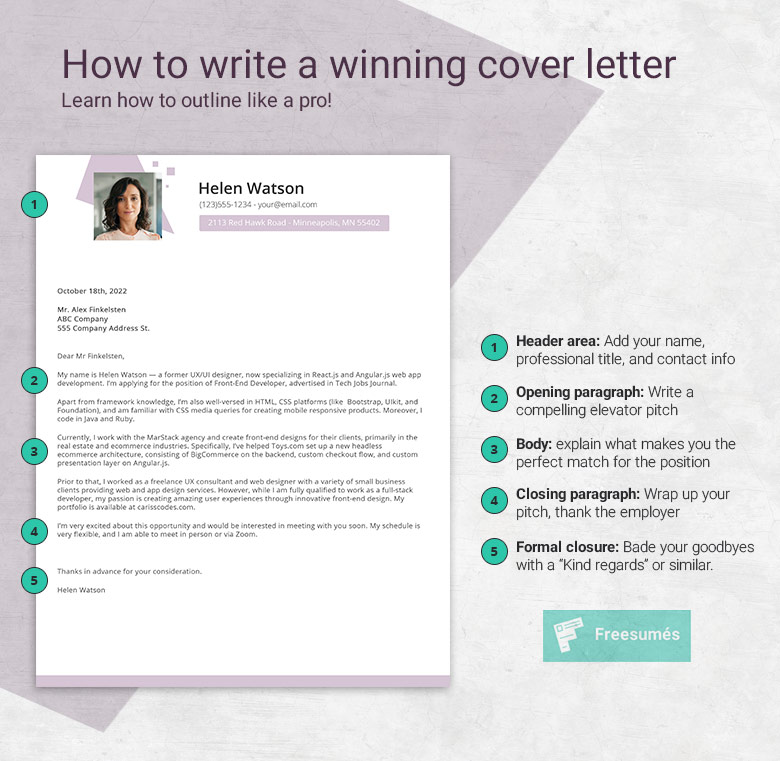
Header section: This one should take approximately 1/5 th of your page and include your name and current position, e.g. Jane Smith, Chief Accountant. You can also add your headshot at the top left corner if you prefer (as an example above) to make your letter more personal. List your contact information just under your name and title.
Opening section: This one should be formal. Add a date and type the full address of your employer in the following format:
To Name Title Company Address City, State Zip Code
This should be single-spaced and left justified. If you don’t know the full employer’s information, you can skip this. Though it’s advised to research those details in advance – this will show that you did your “homework” and didn’t just file some generic letters to a dozen companies in your industry.
Salutation: As a rule of thumb, you should use the formal “Dear, [Mr/Ms Surname]”. Though if you are applying to some hip, modern company you can replace the old-fashioned “dear”, with a simple “Good day” or “Hello” or just “[Name Surname]” combo.
Opening paragraph: This one’s pretty standard as well: state what position you are applying for, how you heard about the opening and why you are a solid candidate. You can make the last statement more attention-grabbing to entice the recipient to read on.
Body of your letter: This can take up to 2-3 paragraphs. Use the space to explain what makes you the perfect match for the announced position:
- Recap your work experience;
- Throw in some bragging rights: results achieved, big gun clients you worked for;
- Briefly summarize your education.
The second body paragraph should speak about why the company is the perfect match for you:
- State how and why this opportunity is a perfect match for your career goals and expectations ;
- Mention how you can relate to the company’s mission and corporate values;
- Highlight that you are a good cultural fit for reasons X, Y, Z.
“Remember CPR (CHALLENGE – PROCESS – RESULTS)! In your cover letter, it is important to demonstrate your exponential value by incorporating strong examples of opportunities where you were presented with a challenge, your process to implement a solution, and the overall results.”

Career Consultant, CPCC, CPRW Colorado, United States
Closing paragraph: Wrap up your pitch, thank the employer for considering you and include a call-to-action. Check our previous post for more tips on how to close a cover letter with a bang.
Formal closure: Bade your goodbyes with a “Kind regards, [Your Name Surname] ”. If you are sending your cover letter the old-fashioned way by mail, you should also add a handwritten signature after that.
“Use a cover letter to introduce yourself, tell the hiring manager who you are, what you are looking for in your next career opportunity, how this job fits in with your career goals and explain why or how you can bring value to the company by highlighting your key skills which are aligned to the job description.”

HR Consultant London, United Kingdom
Top 3 Cover Letter Writing Styles
Sample classic cover letter.
For when your goal is to get that coveted position in a Fortune-500 corporate company or it’s smaller sized counterpart with equally big love for formalities, stick with a very formal, utterly professional cover letter.
This style works best for positions in big business, finance, law, government, retail, and education.
Dear Mr Thompson, I’m writing in response to the position of a Senior Associate Attorney in Divorce Law Firm, advertised on LawCrossing.com. Enclosed you will find my CV.
As an Associate Attorney at FirmX, I was effectively handling probate administration, estate planning and guardianship cases for the past five years. I successfully won 90% of trials for my clients and negotiated favorable settlement agreements on behalf of my clients.
As a former Court Facilitator, Guardian Ad Litem in the state of Colorado, I also possess deep knowledge in family, juvenile and criminal law. My background in court has prepared me for serving to the clients with great compassion and integrity. My colleagues and bosses have noted on my exceptional negotiation skills, as well as great attention to details, discretion and analytical skills.
In 2015, I have re-joined by former alma mater (the University of Northern Colorado) as a part-time Adjunct Professor. I know that your Big Law Firm is well vested in promoting intellectual vigor among younger staff and future employees through mentorship programs, and I would be honored to join in as a mentor if given a chance.
Thank you for taking the time to consider my candidacy and I would welcome the chance to have an in-person discussion with you concerning my application.
Yours sincerely,
Daniela Baker
Speculative Cover Letter Example
Did you know that around 80% of jobs are never advertised publicly? And yet, they are still getting filled in by the savvy candidates. The “Hidden Job Market” isn’t as mythical as Atlántida – it has been effectively thriving since the 1990s.
“Hidden job market” encompasses all the opportunities filled in through employee referral programs, networking and speculative applications. Tapping into this cloaked area of job search means that you won’t rub with as many elbows as when applying for publicly advertised openings.
And here are your tips for finding those hidden opportunities:
- Just ask your friends and family first. Yes, this is deadpan simple. But a lot of people don’t want to come forward about their job search to the close ones. And it’s a shame because your personal network – and the extended personal network – can probably help you land a few solid referrals.
- Ramp up your LinkedIn game. Because LinkedIn is the biggest networking platform out there, where you can effectively connect with the key decision makers in your industry or a bunch of prolific headhunters, who can also send great opportunities your way. So please, get your LinkedIn profile up-to-date and optimize it for relevant keywords .
- Direct applications. The vast majority of company websites now have these “We are hiring” pages with all the listed openings. Most will also have a separate “general inquiry” section where you can file your cover letter and your CV.
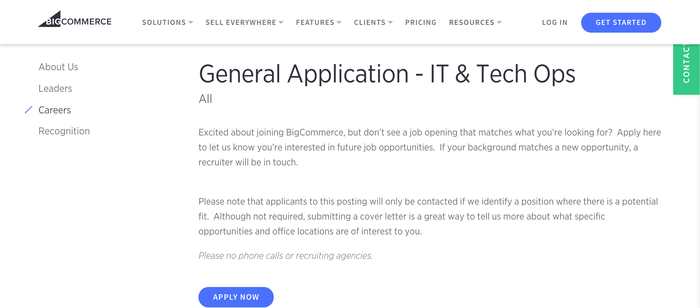
Here’s a sample speculative cover letter you can file along with your application. Depending on the company/industry, such letters can vary in the degree of formality. This sample cover letter is modeled for a modern tech company.
Dear ‘Company Name’ IT Team,
I’ve read on your corporate blog that you have recently completed your migration to a microservices architecture (congrats!).
I believe that you may be now in need of experienced DevOps engineers to help you orchestrate your systems and fine-tune the continuous deployment pipeline. That’s why I am reaching out to propose my candidacy.
In my current role as Remote DevOps Engineer in e-commerce company XXX, I have managed to accomplish the following:
- Reduced deployment time for key infrastructure by a factor of 13.
- Directly managed AWS for the [project name], including configuration and deployment of all required infrastructure, administrative tasks, and budgeting.
I have a strong familiarity with the following tools and technologies:
- Programming skills: Java, JavaScript and C#
- Orchestration & container tools: Jenkins, Docker, Kubernetes, Puppet.
- AWS-certified in 2017.
I’m also flexible to pick up new skills and eager to collaborate with others on your teams. I’m deeply impressed with how you managed remote work at your organization and foster collaboration within a globally distributed team.
Enclosing my CV for your consideration as well.
Regards, Dan Bloome
Creative Cover Letter Example
In some industries, being incredibly formal can work against you. Most startups or creative agencies will find the standard cover letter a tad bit too snotty and personality-less. Even the traditional companies have a soft spot for unusual applications.
The viral cover letter example below has recently landed a great internship with a very prestigious Wall Street firm:
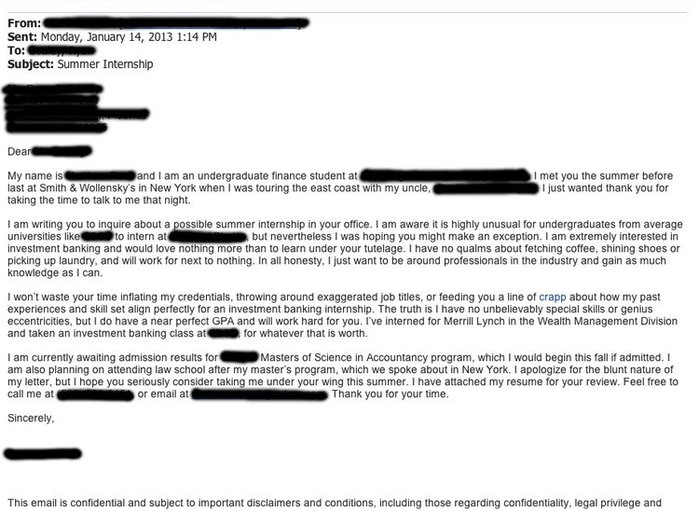
The applicant was brutally honest instead of being painfully polite and superficially flattering.
Want to pull a similar stunt? Here’s a less non-conformist, but equally engaging and creative cover letter example. But do proceed with caution! Such letters may not work every time, with every employer.
Dear [Name Surname],
I think words are boring.
Puzzled to hear that from a copywriter?Well, words alone are boring.
When you just paste some random words to your landing page – no one’s buying from you. No one’s even listening to you. And that’s a bad thing for business (#obvious).
I know how to find the words that will stop your customers right there on the spot, make them scroll back, rub their eye…and reach for their credit card.
So hi, I’m James, a conversion copywriter.
I might have spoken to you earlier. If you browsed SaaS Company website or read CoolCompany blog the other day, that was all me, watching you from the other side of the screen.
I also did some okay writing for the following companies:
- AwesomeApp Landing Page – average conversion rate 12% and over 10,000 sign-ups in the first 24-hours after the launch.
- New Homepage for Brand Z – a 2X lift in conversions within 3 months.
And that’s just the tip of the iceberg.
I don’t just write. I also talk – to your customers, your team and (sometimes in my sleep) – to capture that “special something” that makes everyone tick about your product. I also have a deep love for numbers and get way too excited by heatmaps (my girlfriend’s not thrilled, so please don’t tell her I mentioned this!).
So what do you say? Shall we talk about how I can help your brand develop that new unique voice and drive more sales through data-backed copy?
Regards, James Knight
P.S. I noticed one major gap on your Service Page Name. Doing a few quick improvements (copy- and design-wise) can increase your conversions by 10-15%.
No matter which format you choose to use, it’s alright to be flexible. Don’t follow the same structure or layout to the last T. Remove paragraphs as needed, experiment with different degrees of formality and don’t forget to customize each letter for each job you are applying for. Hiring managers can sense a generic cover letter a mile away. So you definitely do not want to eschew your chance for landing a job by forgetting to change something as basic as the company name or address!

How it works
Transform your enterprise with the scalable mindsets, skills, & behavior change that drive performance.
Explore how BetterUp connects to your core business systems.
We pair AI with the latest in human-centered coaching to drive powerful, lasting learning and behavior change.
Build leaders that accelerate team performance and engagement.
Unlock performance potential at scale with AI-powered curated growth journeys.
Build resilience, well-being and agility to drive performance across your entire enterprise.
Transform your business, starting with your sales leaders.
Unlock business impact from the top with executive coaching.
Foster a culture of inclusion and belonging.
Accelerate the performance and potential of your agencies and employees.
See how innovative organizations use BetterUp to build a thriving workforce.
Discover how BetterUp measurably impacts key business outcomes for organizations like yours.
A demo is the first step to transforming your business. Meet with us to develop a plan for attaining your goals.

- What is coaching?
Learn how 1:1 coaching works, who its for, and if it's right for you.
Accelerate your personal and professional growth with the expert guidance of a BetterUp Coach.
Types of Coaching
Navigate career transitions, accelerate your professional growth, and achieve your career goals with expert coaching.
Enhance your communication skills for better personal and professional relationships, with tailored coaching that focuses on your needs.
Find balance, resilience, and well-being in all areas of your life with holistic coaching designed to empower you.
Discover your perfect match : Take our 5-minute assessment and let us pair you with one of our top Coaches tailored just for you.

Research, expert insights, and resources to develop courageous leaders within your organization.
Best practices, research, and tools to fuel individual and business growth.
View on-demand BetterUp events and learn about upcoming live discussions.
The latest insights and ideas for building a high-performing workplace.
- BetterUp Briefing
The online magazine that helps you understand tomorrow's workforce trends, today.
Innovative research featured in peer-reviewed journals, press, and more.
Founded in 2022 to deepen the understanding of the intersection of well-being, purpose, and performance
We're on a mission to help everyone live with clarity, purpose, and passion.
Join us and create impactful change.
Read the buzz about BetterUp.
Meet the leadership that's passionate about empowering your workforce.

For Business
For Individuals
How to write an impactful cover letter for a career change

Ace your job search
Explore effective job search techniques, interview strategies, and ways to overcome job-related challenges. Our coaches specialize in helping you land your dream job.
Jump to section
How to write a cover letter for a career change
Career change cover letter examples.
8 tips to write a successful career change cover letter
Learning to navigate career changes
As a job seeker, your primary objective is to stand out from every other candidate — and writing a strong cover letter is a great way to do this.
But if you’re trying to change careers, it might seem more complicated. Crafting a compelling letter for a career change needs to put your best foot forward while explaining how your experience and transferable skills make you the best fit.
Luckily, like any application, cover letters give you a unique opportunity to make a strong first impression on a prospective employer. They’re your opportunity to spin a perceived drawback into a valuable asset, showing hiring managers your unique perspective and ability to make a change.
Let’s start with the basics. Like any other professional communication, every word of your career change cover letter counts. Your relevant skill set, work experience, and communication style let a recruiter, hiring manager, or potential supervisor know what it’ll be like to work with you.
Here’s how to use your cover letter to make an impact:
1. Start with a powerful introduction
The first few lines of your cover letter set the tone and pique your reader's interest (or spur disinterest). Skip generic introductions and aim for an opening line that quickly encapsulates the value you can bring to the new job. It can also reflect your unique personality, within reason.
Don’t be shy about identifying yourself as a career changer. It’s an opportunity to showcase important soft skills — such as courage, intellectual curiosity , and a resilient mindset — and connect relevant experiences with valuable transferable skills . With the right framing, it may be the key to standing out as an interesting candidate.
Here’s an example: “As a seasoned journalist, I’m eager to transition into public relations. I've spent the last 20 years sharpening my critical-thinking, research, and copywriting skills, which will serve me well in this new role.”
2. Develop your full character
Your opening paragraph should include your previous role and new career ambition. Next, it’s time to offer a glimpse of your professional drive and explain in more detail what you bring to a career switch, especially if you’ve been upskilling, taking classes, or attending trainings. This is an opportunity to blend your established reputation with your new career goals. If you’re making the change to pursue your passion or do more meaningful work, putting that fact on diisplay creates a fuller image of your personal values , mission, and vision for the future.
For example: “I currently manage a team of 50 sales representatives in the constantly evolving healthcare sector. The most fascinating and fulfilling part of my job has always been developing a deep understanding of my client’s needs. Acting as a bridge to better service, consulting with them about updating their tools and training to focus on providing excellent treatment to their patients is so rewarding. I’m excited by the prospect of leveraging my social skills and years of experience working directly with healthcare providers to move into software development for the healthcare sector.”
3. Show some emotion

Carefully placed action verbs and feelings help make your experience jump off the page. Potential employers aren’t just looking for a list of key skills — they want to imagine the person behind them. Choose language that conveys enthusiasm, drive, and work motivation , like “I’ve always been passionate about problem-solving and teamwork” or “I immediately connected with your company’s vision and commitment to sustainability.”
4. Describe your past performance
Your successes in previous roles are the best predictor of the meaningful work you’ll accomplish in the next one — even if you’re moving to a new industry. Focus on accomplishments that demonstrate flexibility and a learning mindset to help the hiring manager envision a successful transition. You need to make the most out of your letter of interest , portfolio , and resume, so put the highlights on your resume and tell the story in your cover letter.
For instance: “I oversaw a project to automate sales tracking systems, working with our tech team to evaluate the best strategies for the sales department. The project improved efficiency by 25% and decreased overhead costs by 15%.”
Metrics quantify the value of your growth mindset and show off important skills like team collaboration , project management , and adaptability.
5. Align your skills with the job description
Even if you’re at the height of your career, a hiring manager needs to know you can bridge the gap between your current role and the new position. Pay careful attention to the soft and hard skills they mention in the job posting and work them into your career transition cover letter. Don’t embellish for the sake of standing out, but do highlight the skills you can back up with valuable, direct experience.
6. Write a memorable closing
Your closing is your opportunity to reiterate your excitement about the job opening. Adjectives like “eager,” “excited,” and “thrilled” demonstrate you’re ready to hit the ground running.
Additionally, your cover letter for switching careers should invite further dialogue with a call to action. For example: “I’m eager to learn more about the role and look forward to sharing how I can bring my unique perspective and years of experience in [industry] to your organization.”

Before digging into your resume or cover letter, a potential employer may peruse your job application or LinkedIn profile to understand your value as a candidate. Your cover letter is your first opportunity to turn a list of skills and experiences into a well-rounded picture of your character.
The best cover letters balance highlighting your unique personality and perspective with proving you have what it takes to fill the job description. While your letter should represent you, you don’t have to start from scratch. Instead, build your own using a basic structure and templates for inspiration. You can also ask ChatGPT to generate a first draft for you with strategic prompts .
Here’s a general career change cover letter sample to consider:
Dear [hiring manager’s name],
Thank you for considering my application for [ prospective job title] at [company name].
I’ve spent the last [years of experience] learning the ins and outs of [current industry], where I currently work as a [most recent job title]. I gravitated toward [industry] because of my passion for [the factors that pushed you to your current career]. The most fulfilling part of my career has been [transferable skills relevant to the new job posting]. I’ve built my expertise around [relevant skills], which were instrumental in accomplishing [a notable achievement or project].
I’m excited to transition into a new career chapter and follow my calling in [new field]. Reading about your company, I immediately connected with [core value]. I’m thrilled by the prospect of contributing [your vision or skills] and am eager to apply my unique perspective as a [current job title] in a new context.
Attached is my resume. I’m eager to learn more about the company and how my background aligns with your needs.
I look forward to the opportunity to continue the conversation.
Sincerely,
[Your name]
When changing careers, you may feel worried about potential red flags in your resume, like career gaps or lack of direct experience . While your technical abilities are important, many recruiters and hiring managers prioritize soft skills , like leadership, critical thinking, and communication. Here’s a cover letter that balances proven soft skills and highlights your excitement to fill the gaps:
Thank you for the opportunity to apply for [prospective job title] at [company name]. While I’ve developed my career in [industry], my enthusiasm for [relevant interest] combined with my proven [relevant transferable skills] has prepared me for this career path.
Over the last [years of experience], I’ve cultivated a solid foundation in [relevant skills], which mirror the dynamic demands of [new industry].
I’m attracted to [new industry] because of [your interest or inspiration to switch to a new field]. The [specific aspect of your new field] that [company name] embodies deeply resonates with my personal values and professional aspirations. I’ve spent the last [months or years] learning [valuable technical skills or industry knowledge] through [examples of learning experiences, such as a class, seminar, or networking opportunity].
Attached is my resume, which underscores my transferable skills and [relevant coursework or certifications].
I’m confident that my adaptability, dedication to quality work, and passion for learning position me to hit the ground running and become a strong asset to your team. I look forward to discussing how my excitement and skill set align with your objectives.
8 tips to write a successful career change cover letter

Now that you have some cover letter examples for changing careers, let’s get into the fine print. Here are eight tips to help your career change cover letter lead to an interview:
- Address the letter to the right person: General salutations — like “Dear hiring manager” — may give the impression you’re copying and pasting the same cover letter across several job postings. Likewise, it signals to the reader that you lacked the initiative and dedication to find out more about the role and the hiring team beyond what’s in a brief job posting. Take the time to learn the hiring manager's name and use it to kick off communications.
- Keep things short: The objective of your cover letter is to spark a hiring manager’s interest and encourage them to read your resume . Keep your cover letter to a few well-curated paragraphs that balance your unique value with the requisites for the job role.
- Research, research, research: The company’s website, social media, and other branded materials can provide insight into the organization’s mission and core values. Aligning your vision with the company’s is a great way to capture a hiring manager’s attention and let them know you fit the company culture .
- Explain your reasons for changing careers: The courage to take a chance on yourself and switch careers speaks volumes about your character. It’s nothing to shy away from. Highlight the reasons you decided to make the difficult career decision — your resilience, fortitude, and decisiveness can provide a competitive advantage over more traditional candidates.
- Mention new skills: Highlight how you’ve learned about your new industry, acquired technical skills, and prepared for the career switch. Whether it’s a one-day seminar or several months with a career coach , your drive for personal and professional development helps make your case for a smooth transition into a new industry.
- Source references: Having a list of professional references and their contact information ready to send to a hiring manager is always a good idea. Carefully choose colleagues who can speak to your passion for your new industry and ability to adapt to change.
- Align all your communications: Consistency and clarity are important to hiring managers. When your LinkedIn profile, letter of intent , and resume have mismatched skills and work experience, the person reading them may pass you over for a candidate with a profile that’s easier to understand and imagine in the role. Double-check that all your information is up-to-date and consistent across all platforms and lines of communication.
- Proofread : An enthralling story about your decision to dive into a new field can be thwarted by a misspelled word or poorly placed comma. Spelling and grammar errors can jeopardize your chances of an interview — hiring managers may worry that a lack of attention to detail could show up in more important areas of your work performance. If you’re not a natural copy editor, double-check your work with a proofreading app like Grammarly.
Learning to navigate career changes
A career change is a big life decision , no matter where you are in your professional journey. After you’ve settled into your niche, shaking things up at 30, changing careers at 40 or following a new calling in your 50s might feel increasingly overwhelming.
But it’s never too late to embrace change. Your professional life occupies a big part of your time, energy, and personal identity. You deserve to feel fulfilled — even if that means choosing a road less traveled. Carefully crafting a cover letter for a career change is an effective way to capture a hiring manager's attention from the jump and move one step closer to an exciting new opportunity.
Elizabeth Perry, ACC
Elizabeth Perry is a Coach Community Manager at BetterUp. She uses strategic engagement strategies to cultivate a learning community across a global network of Coaches through in-person and virtual experiences, technology-enabled platforms, and strategic coaching industry partnerships. With over 3 years of coaching experience and a certification in transformative leadership and life coaching from Sofia University, Elizabeth leverages transpersonal psychology expertise to help coaches and clients gain awareness of their behavioral and thought patterns, discover their purpose and passions, and elevate their potential. She is a lifelong student of psychology, personal growth, and human potential as well as an ICF-certified ACC transpersonal life and leadership Coach.
What is gig work and does it make the dream work?
Why is there a labor shortage 5 ways it could impact you, how to answer 8 phone interview questions to ace your interview, how to quit a part-time job: 5 tips to leave on good terms, is personal time off paid how to navigate employer pto plans, how to quit a job you just started: tips and guidance, how to introduce yourself in an interview: examples & tips, everything you need to know about part-time employee benefits, use severance package negotiation to ask for the compensation you deserve, similar articles, 3 cover letter examples to help you catch a hiring manager’s attention, how to ask for a letter of recommendation (with examples), how to write a great cover letter in 2024: tips and structure, a guide on how to pick a new career, what is a letter of intent examples on how to write one, wondering how to change careers 12 steps to switch it up, tips and tricks for writing a letter of interest (with examples), perfect is the enemy of the good: 4 ways to thrive in ambiguity, chatgpt cover letters: how to use this tool the right way, stay connected with betterup, get our newsletter, event invites, plus product insights and research..
3100 E 5th Street, Suite 350 Austin, TX 78702
- Platform Overview
- Integrations
- Powered by AI
- BetterUp Lead
- BetterUp Manage™
- BetterUp Care™
- Sales Performance
- Diversity & Inclusion
- Case Studies
- Why BetterUp?
- About Coaching
- Find your Coach
- Career Coaching
- Communication Coaching
- Life Coaching
- News and Press
- Leadership Team
- Become a BetterUp Coach
- BetterUp Labs
- Center for Purpose & Performance
- Leadership Training
- Business Coaching
- Contact Support
- Contact Sales
- Privacy Policy
- Acceptable Use Policy
- Trust & Security
- Cookie Preferences
- Get the Job
- Resumes and CVs
- Applications
- Cover Letters
- Professional References
Professional Licenses and Exams
- Get a Promotion
- Negotiation
- Professional Ethics
- Professionalism
- Dealing with Coworkers
- Dealing with Bosses
Communication Skills
Managing the office, disabilities, harassment and discrimination, unemployment.
- Career Paths
- Compare Careers
- Switching Careers
- Training and Certifications
- Start a Company
- Internships and Apprenticeships
- Entry Level Jobs
- College Degrees
Growth Trends for Related Jobs
How to write a letter requesting a future job opening.

Most of the time when job-seeking, you are submitting a cover letter for a specific advertised position within a company. However, other times, there may be a company that you are interested in working for, but there is no exact position available. In this case, you can write a letter requesting information about future job openings . This letter can be effective in getting invited to apply for open positions that are not being advertised to the public.
Type your contact information at the top of the letter. Include your address, phone number and email address.
Add the date one line below your contact information.
Type out the name, title and business address for the person you are writing to. A letter requesting a future job opening should always be written to a specific person, such as the hiring manager or director of the Human Resources department. If you’re not sure who to address it to, call the company.
Address the letter with a friendly salutation and the person’s formal title, such as “Dear Ms. Smith.”
Explain a little bit about yourself in the first sentence. For example, you might include your education level or when you will graduate and the most impressive of your professional positions.
Explain to the recipient if you received his or her name from a specific person or if you heard of the company through a friend. You might also have just researched the company and thought you would be a good fit. It’s okay to say that, too.
Talk about your career goals and why you think you would be a good fit for the company. Also, state the type of position or department that you’re most interested in.
Request more information at the end of the letter. Explain that if there are any openings or when openings occur in the future, you would appreciate more information and the opportunity to apply. State that you have enclosed your resume for review.
End the letter. Use a professional closing, like “Regards” or “Thank You,” and type your name a few spaces below. Skip one space and type “Encl.” to indicate your resume. Provide your signature between the closing and your typed-out name once the letter is in hard copy.
Related Articles
How to write job application letters →.

What Is a Letter of Interest When Applying for a Job? →

How to Write a Letter of Introduction →

What Are the Contents of an Application Letter? →

How to Write a Letter of Intent for Work →
How to write a professional letter template →.

J. Johnson has been completing freelance writing work since September 2009. Her work includes writing website content and small client projects. Johnson holds a degree in English from North Carolina State University.
fizkes/iStock/GettyImages
- Job Descriptions
- Law Enforcement Job Descriptions
- Administrative Job Descriptions
- Healthcare Job Descriptions
- Sales Job Descriptions
- Fashion Job Descriptions
- Education Job Descriptions
- Salary Insights
- Journalism Salaries
- Healthcare Salaries
- Military Salaries
- Engineering Salaries
- Teaching Salaries
- Accessibility
- Privacy Notice
- Cookie Notice
- Copyright Policy
- Contact Us
- Find a Job
- Manage Preferences
- California Notice of Collection
- Terms of Use
Government agencies communicate via .gov.sg websites (e.g. go.gov.sg/open). Trusted websites Trusted websites
Look for a lock ( ) or https:// as an added precaution. Share sensitive information only on official, secure websites.
5 minute read
Cover Letter Examples and Samples
Cover letters allow you to introduce yourself to the employer and explain why you are the right fit for the job. here is why it is an essential tool in your job search..
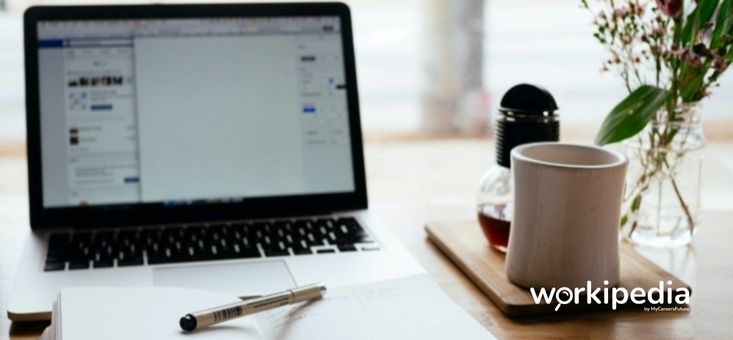
What is a Cover Letter For?
When it comes to job hunting, one document that comes to mind is a cover letter. You may have heard about it, but do you really know what it is for? A cover letter is essentially a formal letter that accompanies your resume or job application. It allows you to introduce yourself to the employer and explain why you are the right fit for the job. Here is why it is an essential tool in your job search.
Introducing Yourself:
The first purpose of a cover letter is to introduce yourself to the employer. You can provide details such as your name, contact information, and any relevant professional or academic background. It gives the employer an idea of who you are and sets the tone for the rest of the cover letter.
Expressing Interest:
One of the most important functions of a cover letter is to demonstrate your interest in the job and the company. This is where you can explain why you are interested in the particular position and how it fits with your career goals. This shows that you are genuinely enthusiastic about the job and that you have done your research on the company.
Looking for a job? Explore a range of career opportunities with Career GRIT. Connect with hiring employers at various career events such as walk-in interviews, virtual job interviews, virtual career fairs, and many more!
Highlighting Qualifications:
Another key function of a cover letter is to highlight your qualifications. You can expand on specific points from your resume to provide more context and explain how they relate to the job you are applying for. This is your chance to showcase your skills and experiences that make you a strong fit for the role.
Personalising Your Application:
One mistake that many job seekers make is sending the same cover letter to every job they apply for. A well-crafted cover letter can be tailored to match the requirements and values of the company you’re applying to. Personalising your cover letter to the company shows that you have done your research and are a good fit for the company culture.
Showcasing Communication Skills:
Writing a clear, well-structured, and error-free cover letter demonstrates your communication and writing skills, which are valuable in many job roles. It is essential to proofread your cover letter carefully, as it reflects on your attention to detail and professionalism.
Differentiating Yourself:
Finally, a cover letter allows you to stand out from other applicants and make a memorable impression on the employer. It is your chance to express your personality and professionalism , which can leave a lasting impression on the employer.
Requesting an Interview:
Toward the end of the cover letter, expressing your desire for an interview is customary. This is your chance to explicitly state that you would like to discuss your qualifications further and take the following steps in the hiring process.
In conclusion, a cover letter is a crucial part of a job application. It serves as a personalised introduction to your resume and gives you the opportunity to explain why you are the right fit for the job. By highlighting your qualifications and personalising your application, you can increase your chances of being invited for an interview and ultimately landing your dream job.
Find your next job on MyCareersFuture. We have over 100,000 job opportunities daily for you.
Brief overview of the different types of cover letters and samples
Depending on the situation, there are several types of cover letters that you can use to put your best foot forward. Here, we take a closer look at the different types of cover letters and samples to help you choose the most appropriate one for your situation.

1. Application Letter
This is the most common type of cover letter, and it’s used when applying for a specific job opening. An application letter should include an introduction that grabs the employer’s attention, a brief summary of your qualifications and experience highlighting your skills and achievements, and a closing statement expressing your interest in the position and the company.
Dear [Employer’s Name],
I am writing to apply for the [Job Title] position at [Company Name], as advertised on [Job Board/Company Website] on [Date]. I am thrilled to express my strong interest in this position and to highlight how my unique combination of [X years of] experience in [Relevant Skill/Industry] and [Additional Relevant Education or Certification] make me an ideal candidate for this role.
As a highly skilled [Previous Position], I have [Achievement or Responsibility that Demonstrates Relevant Skills and Abilities]. This experience has enhanced my expertise in [Specific Skills Relevant to the Job], and I am enthusiastic about the opportunity to bring my knowledge and skills to [Company Name]. Furthermore, my additional experience in [Additional Relevant Skills] and my ability to [Mention Any Additional Relevant Skills or Qualifications] position me as a highly qualified candidate.
I am drawn to [Company Name] because of its reputation for [Company’s Unique Selling Point or Mission Statement], and I am eager to contribute to the mission of an organisation that embodies [Specific Company Values or Initiatives]. My research shows that [Company Name] has an outstanding record of embracing innovation, cultivating creativity, and driving progress. I am confident that my skills in [Relevant Skills] and my dedication to [Specific Traits/Values] make me an excellent candidate who will support [Company Name] in achieving its goals.
Enclosed is my resume, which provides additional information about my academic background, professional experience, and notable achievements. I am excited to discuss further how my skills align with the requirements of [Company] goals and vision, contribute to your ongoing projects, and drive progress forward. I believe I can bring significant value to your team and be a valuable asset to your organisation.
Thank you for considering my application, and I look forward to the opportunity to discuss my qualifications further. Please do not hesitate to contact me at [Your Phone Number] or [Your Email Address] to schedule an interview.
[Your Full Name]
Dear Ms. Tamara,
I am writing to apply for the Sales Manager position at X Corp , as advertised on MyCareersFuture on 1-Jan-23. I am thrilled to express my strong interest in this position and to highlight how my unique combination of 8 years of experience managing sales operations experience in the Financial Industry and Certified Professional Salesperson (CPSP) make me an ideal candidate for this role.
As a highly skilled Sales Operation Manager, I have increased revenue by 40% within two years by implementing a new sales strategy and refining our team’s outreach techniques. This experience has enhanced my expertise in analysing market trends, identifying key opportunities, and fostering strong relationships with clients and team members. I am enthusiastic about the opportunity to bring my knowledge and skills to X Corp .
Furthermore, my additional experience as a sales team manager with a proven track record of leading teams to develop and implement new products and services that not only meet but exceed customer needs positions me as a highly qualified candidate.
I am drawn to X Corp because of its reputation as the world’s 1 Customer Relationship Management. I am eager to contribute to the mission of an organisation that embodies innovation and customer success. My research shows that X Corp has an outstanding record of embracing innovation, cultivating creativity, and driving progress. I am confident that my skills in sales and my dedication to customer success make me an excellent candidate who will support X Corp in achieving its goals.
Enclosed is my resume, which provides additional information about my academic background, professional experience, and notable achievements. I am excited to discuss further how my skills align with the requirements of X Corp’s vision and goals and, contribute to your ongoing projects, and drive progress forward. I believe I can bring significant value to your team and be a valuable asset to your organisation.
Thank you for considering my application, and I look forward to the opportunity to discuss my qualifications further. Please do not hesitate to contact me at +65 9000 0000 or Cindy @email.com to schedule an interview.
Need personalised guidance in your job search? Register for a complimentary session with WSG’s Career Matching Services today and get the support you need.
2. Networking/Prospecting Cover Letter
A networking cover letter is used when you’re interested in job opportunities within a specific industry or company, even if there are no current job postings. The goal is to build a professional connection and express your interest in potential future roles. In this type of letter, it’s important to introduce yourself, explain your goals and interests, and provide examples of relevant experience.
I hope this letter finds you well. I am writing to express my keen interest in exploring career opportunities with [Company Name]. As someone who is passionate about [Your Field], I have been following [Company Name] ‘s progress with great interest, and I believe my skills could be an asset to your team.
I am a highly motivated and accomplished [Your Field] professional with [Number of Years] years of experience. I have honed my skills in [Specific Area], [Specific Area], and [Specific Area]. Throughout my career, I have dedicated myself to [Mention Relevant Achievement], and I am always seeking new challenges and opportunities to grow professionally.
I am particularly impressed by [Company Name] ‘s reputation for [Mention Specific Aspect of the Company, such as Innovation, Quality, or Customer Service]. Your company’s commitment to [Mention Relevant Company Goals] aligns with my own values and professional goals.
Here are a few highlights of my qualifications:
[Highlight a Key Skill or Achievement Relevant to the Company’s Needs], which has enabled me to [Mention Relevant Accomplishment].
[Mention Another Relevant Skill or Accomplishment], which demonstrates my ability to [Mention Relevant Achievement].
[Include a Brief Explanation of Your Expertise or Experience in a Specific Area], which could be of particular interest to your team.
I am confident that my skills and experience could contribute significantly to [Company Name] ‘s continued success. I am excited by the possibility of exploring career opportunities with your team and would welcome the chance to discuss this further with you.
Please feel free to contact me at [Your Phone Number] or via email at [Your Email Address]. I would be happy to answer any questions you may have or provide additional information on my background and qualifications.
Thank you for considering my application. I look forward to hearing from you soon.
[Your Name]
Dear Mr. Gemma,
I hope this letter finds you well. I am writing to express my keen interest in exploring career opportunities with X Corp . As someone who is passionate about digital marketing , I have been following X Corp’s progress with great interest, and I believe my skills could be an asset to your team.
I am a highly motivated and accomplished digital marketing professional with two years of experience. I have honed my skills in social media management, email marketing, and marketing analytics. Throughout my career, I have dedicated myself to marketing, and I am always seeking new challenges and opportunities to grow professionally.
I am particularly impressed by X Corp’s reputation for producing the most creative marketing campaigns . Your company’s focus on community building aligns with my own values and professional goals.
Strategic Content Creation
- Developed and implemented content strategies that consistently engaged the target audience, resulting in a 5% MOM increase in website traffic and a 10% YOY growth in social media following.
Email Marketing Expertise
- Led successful email marketing campaigns, achieving an average open rate of 10% and click-through rate of 7%, well above industry benchmarks.
Data Analytics and Reporting
- Proficient in using tools like Google Analytics, SEO tools, and social media analytics to track campaign performance, generate actionable insights, and make data-driven optimisations.
I am confident that my skills and experience could contribute significantly to X Corp’s continued success. I am excited by the possibility of exploring career opportunities with your team and would welcome the chance to discuss this further with you.
Please feel free to contact me at +65 9000 000 or via email at Whitney @email.com . I would be happy to answer any questions you may have or provide additional information on my background and qualifications.
3. Referral Cover Letter
If someone in your professional network has referred you to a job opportunity, a referral cover letter is the way to go. This type of letter should begin with a reference to the person who referred you, and then you can go on to explain your interest in the company and why you believe you’re a good fit for the position.
Dear [Recipient’s Name],
I am excited to express my interest in the [Position Name] role at [Company Name]. [Referrer’s Name], a valued professional connection of mine, recommended that I apply for this role. [He/She] spoke highly of the company, the team, and the culture, so I am eager to explore this opportunity further.
As a skilled [Job Title] with [Number of Years] years of experience in [Industry], I am confident in my ability to add value to your team. Throughout my career, I have honed my expertise in [Key Skills/Qualifications], which I believe closely aligns with the requirements of this position. Additionally, I am passionate about [Industry/Product/Service] and have been following [Company Name] ‘s work in this field for some time. Your innovative approach to [Area of Expertise], coupled with the strong reputation you have established within the industry, is why I am motivated to join your team.
In my current role at [Current Company], I have successfully accomplished [Key Achievements]. With this experience, I am confident that I can bring the same level of success and dedication to [Company Name]. Additionally, I am a fast learner and can adapt quickly to new environments. I strongly believe that my skill set, coupled with my passion for your company’s vision, will enable me to make a valuable contribution to your team.
I look forward to learning more about this role and further discussing how my skills, expertise, and passion can benefit [Company Name]. Thank you for considering my application. I have attached my resume and look forward to hearing from you soon.
Best regards,
Dear Sherrie,
I am excited to express my interest in the role at X Corp. Brian, a valued professional connection of mine, recommended that I apply for this role. He spoke highly of the company, the team, and the culture, so I am eager to explore this opportunity further.
As a skilled data engineer with four years of experience in cybersecurity , I am confident in my ability to add value to your team. Throughout my career, I have honed my expertise in Data Security, which I believe closely aligns with the requirements of this position. Additionally, I am passionate about cybersecurity and have followed X Corp’s work in this field for some time. Your innovative approach to helping businesses protect online stores and recover hacked websites, coupled with the strong reputation you have established within the industry, is why I am motivated to join your team.
In my current role as Data Engineer, I have successfully spearheaded the design and implementation of a cutting-edge Real-Time Threat Detection System, which significantly enhanced the company’s ability to identify and respond to cyber threats proactively. With this experience, I am confident that I can bring the same level of success and dedication to X Corp . Additionally, I am a fast learner and adapt quickly to new environments. I strongly believe that my skill set, coupled with my passion for your company’s vision, will enable me to make a valuable contribution to your team.
I look forward to learning more about this role and further discussing how my skills, expertise, and passion can benefit X Corp. Thank you for considering my application. I have attached my resume and look forward to hearing from you soon.
Considering a Mid-Career Switch? Register for a complimentary session with WSG’s Career Matching Services for some helpful guidance today.
4. Cover Letter for a Career Change
Suppose you’re transitioning to a new field or industry, and your previous experience may not directly align with the job you’re applying for. In that case, a career change cover letter can help explain your motivations and transferable skills. In this type of letter, it’s important to provide examples of how your previous experience is relevant to the new field and to explain why you’re interested in making the transition.
I am writing to express my strong interest in the [Position Name] role at [Company Name]. As someone with a solid background in [Current Industry/Role], I am eager to leverage my transferable skills and embark on an exciting new career path in [Target Industry/Role].
Throughout my [X years] in [Current Industry/Role], I have developed valuable skills in areas such as [Relevant Skills]. While I have enjoyed my experiences in this field, I have realised that my true passion lies in [Target Industry/Role]. I am enthusiastic about the prospect of contributing my experiences to a dynamic and innovative team like yours.
What excites me most about the opportunity at [Company Name] is the chance to bring my skills and fresh perspective to [Target Industry/Role] while also collaborating with a driven team committed to improving lives through innovative solutions. I am confident that my ability to manage projects and communicate across diverse teams will make a positive impact and help me quickly adapt to this new environment.
To prepare for my transition to [Target Industry/Role], I have been proactive in undertaking several development opportunities, such as completing courses in [mention any relevant courses or certifications you’ve completed] and volunteering with organisations that align with [Company Name] ‘s mission. Through these experiences, I have developed a comprehensive understanding of [Target Industry/Role] and gained valuable insights that connect well with the vision at [Company Name].
Enclosed is my resume, which provides a more detailed overview of my background and qualifications. I welcome the opportunity to discuss how my skills and experiences align with your needs for the [Position Name] role at [Company Name]. Please feel free to contact me at [Your Phone Number] or via email at [Your Email Address] to schedule a conversation.
Thank you for considering my application. I am excited about the possibility of contributing to the growth and success of [Company Name] and am eager to explore this career change opportunity further.
Dear Mr. Johnson,
I am writing to express my strong interest in the Project Management role at X Corp . As someone with a solid background in Customer Relations , I am eager to leverage my transferable skills and embark on an exciting new career path in Project Management.
Throughout my five years in Customer Relations, I have developed valuable skills in areas such as project management, communication, and problem-solving. While I have enjoyed my experiences in this field, I have realised that my true passion lies in Project Management. I am enthusiastic about the prospect of contributing my experiences to a dynamic and innovative team like yours.
What excites me most about the opportunity at X Corp is the chance to bring my skills and fresh perspective to Project Management while also collaborating with a driven team committed to improving lives through their innovative solutions. I am confident that my ability to manage projects and communicate across diverse teams will make a positive impact and help me quickly adapt to this new environment.
To prepare for my transition to Project Management , I have been proactive in undertaking several development opportunities, such as completing courses in Project Management by Google and volunteering with organisations that align with achieving goals in a purposeful, focused, and effective way. Through these experiences, I have developed a comprehensive understanding of project management and gained valuable insights that connect well with the vision at X Corp.
Enclosed is my resume, which provides a more detailed overview of my background and qualifications. I welcome the opportunity to discuss how my skills and experiences align with your needs for the Project Management role at X Corp. Please feel free to contact me at +65 9000 000 or via email at [email protected] to schedule a conversation.
Thank you for considering my application. I am excited about the possibility of contributing to the growth and success of X Corp and am eager to explore this career change opportunity further.
Planning a career move? Use CareersFinder, a personalised jobs and skills recommender on MyCareersFuture, to plan out your next steps. Unlock your potential today!
5. Cover Letter for Internship
Applying for an internship position requires a specific type of cover letter. This letter should focus on your academic qualifications, relevant coursework, and why you want to gain experience in a particular field. It’s also important to be enthusiastic and show a willingness to learn and contribute to the organisation.
Dear [Employer’s Name or Hiring Manager],
I hope this letter finds you well. I am writing to express my interest in the [Internship Position] at [Company Name] for [semester/year]. As a [Your Major] student at [Your University], I am eager to apply my academic knowledge and gain practical experience in [mention relevant field].
Your company’s reputation for [mention something specific about the company that interests you, e.g., innovative projects, commitment to sustainability] has drawn me to apply for this internship. I am impressed by the quality of work your team produces and believe that working alongside your professionals would provide me with an invaluable learning opportunity.
During my time at [Your University], I have gained a solid foundation in [mention relevant coursework or skills]. From my [list relevant coursework or projects that showcase your skills], I have developed a strong understanding of [mention specific skills or knowledge]. Additionally, I have actively participated in [mention extracurricular activities or volunteer work] to enhance my professional skills further.
I am confident that my skills and enthusiasm for [mention relevant field] would enable me to contribute positively to your team. Being a proactive team member, I am committed to ensuring that the success of your projects is prioritised. I am also a quick learner and would relish the opportunity to develop my skills further while collaborating with your team.
I have attached my resume for your review, which showcases my academic background, skills, and experiences. I am available to discuss how I can add value to [Company Name] as an intern. Please do not hesitate to contact me at [Your Phone Number] or via email at [Your Email Address] to arrange a conversation.
Thank you for considering my application. I am excited at the prospect of interning at [Company Name] and look forward to hearing from you soon.
Dear Cathy,
I hope this letter finds you well. I am writing to express my interest in the Public Relations internship at X Corp for Summer 2024 . As a Journalism student at ABC University , I am eager to apply my academic knowledge and gain practical experience in Public Relations/
Your company’s reputation for fostering community inclusion has drawn me to apply for this internship. I am impressed by the quality of work your team produces and believe that working alongside your professionals would provide me with an invaluable learning opportunity.
During my time at ABC University , I have gained a solid foundation in written and verbal communication. From my PR campaigning course , I have developed a strong understanding of writing press releases, performing pitches and crafting compelling content. Additionally, I have actively participated in student council to enhance my professional skills further .
I am confident that my skills and enthusiasm for Public Relations would enable me to contribute positively to your team. Being a proactive team member, I am committed to ensuring that the success of your projects is prioritised. I am also a quick learner and would relish the opportunity to develop my skills further while collaborating with your team.
I have attached my resume for your review, which showcases my academic background, skills, and experiences. I am available to discuss how I can add value to X Corp as an intern. Please do not hesitate to contact me at +65 9000 0000 or via email at [email protected] to arrange a conversation.
Thank you for considering my application. I am excited at the prospect of interning at X Corp and look forward to hearing from you soon.
In conclusion, whether you are in the early stages of your career or a seasoned professional , having an effective cover letter is an essential key to the success of any job application. An effective cover letter can help you stand out among other applicants and increase your chances of landing a great job. Fortunately, with the help of cover letter examples and samples, it is easier than ever.
Additionally, by editing and customising the sample letters provided, it is easy to personalise them to fit your needs. Ultimately, using these examples as a launching point can save you time and ensure your message is clear and concise. Good luck and best wishes in your job search!
Related topics:
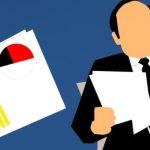
Should Resumes be Functional or Chronological? Here Are Some Templates Either Way
2 minute read

The Complete Resume & Cover Letter Proofreading Checklist You Need
4 minute read
Quick share
Enjoyed reading this? View other related articles below:
Tips for new entrants joining the workforce

First Time Looking for Jobs? Read This Beginner’s Guide

Honesty in Interviews: Here’s Why it Matters
3 minute read

Feedback: Why You Should Ask for It
Advice for managing your mid-career development

3 Things Not to Say When Negotiating Salary for a Mid-Career Switch

Worried About Reaching Your Career Goals? Here Are Some Tips for Singapore’s Broad Middle Workers (PODCAST)

4 Positive Work Habits for Your Mental Well-being
Insights for mature workers to stay relevant

Career Confessions: What Retirement? He Chose to Embark on a Career Switch in His 60s!
14 minute read

Jobs to Consider in the Second Half of Your Career for Mature Workers, and the Skills You’ll Need

Knowledge Sharing: How and Why Guiding Younger Colleagues Benefits Your Career
Home / Cover Letter Examples and Samples
Find more jobs like these at MyCareersFuture Job Portal

An initiative by Workforce Singapore
Whether you are a fresh graduate searching for a new entry-level job or a seasoned veteran considering a career switch, Workipedia by MyCareersFuture is the one-stop website for all your job application needs.

Build my resume
- Resume builder
- Build a better resume in minutes
- Resume examples
- 2,000+ examples that work in 2024
- Resume templates
- 184 free templates for all levels
- Cover letters
- Cover letter generator
- It's like magic, we promise
- Cover letter examples
- Free downloads in Word & Docs
5 Career Change Cover Letter Examples Made for 2024
- Career Change Cover Letter
- Career Change No Experience
- HR Career Change
- Teacher Career Change
- RN Career Change Cover Letter
- Write Your Career Change Cover Letter
Switching careers can be equal parts exciting and daunting. You’re stepping into a whole new path, facing unknown challenges, and rebuilding your personal brand from scratch. There’s a lot at stake here, and to fight this battle and come out on top, you need to pick the right set of weapons.
Step one: a stellar career change resume tailored to match the job. Step two, however, is more challenging because you must write a cover letter to wow recruiters and express your excitement at a career change and for the company.
We’re here to help you navigate these murky waters and set the course for the career of your dreams. Our career change cover letter examples and free cover letter builder will help you craft a memorable job application.

Career Change Cover Letter Example
USE THIS TEMPLATE
Microsoft Word
Google Docs
Block Format
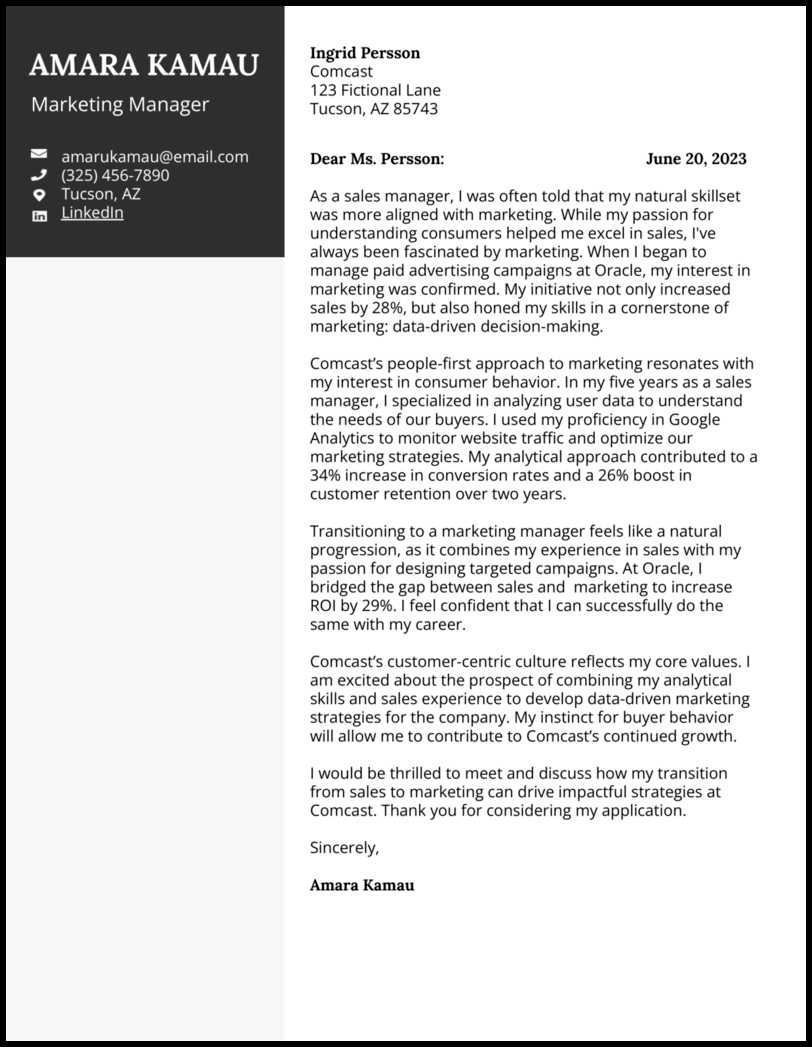
Why this cover letter works
- For instance, this cover letter points to ways the candidate took initiative to connect sales and marketing. This evidences both interest and experience in the target role.
Level up your cover letter game
Relax! We’ll do the heavy lifiting to write your cover letter in seconds.
Career Change No Experience Cover Letter Example

- Take, for instance, how Aria tells the story of her expertise—meticulous data analysis, project management, and problem-solving and convincingly discusses how these can be valuable assets for the new role. So, extract and communicate those transferable skills.
Human Resources Career Change Cover Letter Example

- Such competencies demonstrate that although it’s a career change, you aren’t a stranger to the environment. If the past stints involved the hiring company’s competitor, emphasize that for bonus familiarity points.
Teacher Career Change Cover Letter Example
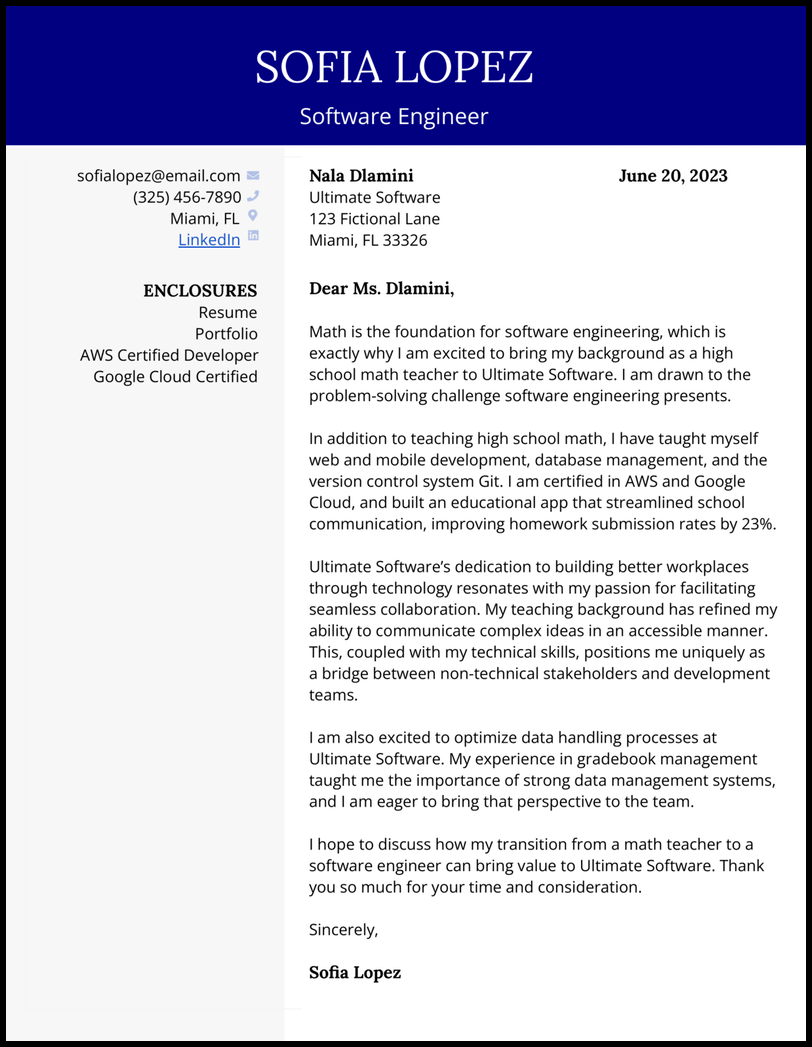
- If you’ve earned professional certifications that don’t match your current role but align with your target career, your cover letter is the place to highlight them.
Registered Nurse (RN) Career Change Cover Letter Example

- Look for unlikely connections between your work experience and target role, then put the pieces together for recruiters in your cover letter.
Related cover letter examples
- Graphic designer
How to Write a Fantastic Career Change Cover Letter

You may think that you’re at a disadvantage when you’re applying outside of your previous career, but when it comes to cover letters, that’s not true. Treat this as an excellent opportunity to be creative and stand out from the crowd.
Here’s the trick: give that job description a good read, then whip your cover letter into shape to mirror it. Try to decipher the company’s core values, be it from the job listing or from its website, and highlight that this mission is important to you too.
Pinpoint similarities across your past and future roles for this. For instance, if you’re switching from teaching to programming, emphasize your ability to explain complex topics to all kinds of audiences.
Writing a winning cover letter intro
The perfect cover letter begins with a personalized greeting that addresses the hiring manager by name. However, if you absolutely cannot find the recipient (try LinkedIn), you can use “Dear Hiring Manager” or “Dear [Company Name] Team.” Refrain from using “To Whom It May Concern” or “Dear Sir/Madam,” as those can be a little outdated by today’s standards.
Avoid generic starters and instead showcase why your past experience is valuable. For instance, if you previously worked in sales and you’re moving to customer service, highlight your ability to forge lasting relationships with clients.
Check out this example of what not to do below. This opening line is definitely on the uninteresting side—the hiring manager might skim your cover letter if it lacks a proper hook.
No, thank you!
“I am writing to apply for the project manager position I saw on your website. I believe this role is a great fit for me.”
Now, the example below is a huge improvement. The applicant immediately makes it clear that they used to have a different career, but they use this to their advantage by highlighting how their background in working with people can have a deep impact on their new career.
Hooked from the start!
I was inspired to transition my career from nursing into sales when I discovered the impact I could make by connecting people with the right product solutions. I am eager to bring my RN background, where relationship-building is paramount, and my skill set in sales forecasting to American Express as a sales manager.
Writing the main part of your cover letter
Roll up your sleeves because we’re diving into the main part of your cover letter—the body. Use this space as an extension of your resume that elaborates on your skills and the way they can make an impact on the company.
Find common ground and share some of your greatest achievements that translate well to your new role. For example, if you’re a marketer transitioning into sales, discuss how spearheading a social media campaign increased your company’s revenue by 18%.
Use metrics to support your accomplishments. Things like revenue, ROI, click-through rates, open rates, customer satisfaction ratings, budget savings, or efficiency improvements all apply to most industries. Much like in the intro, connect your background to match the company.
Here’s a body paragraph for inspiration:
In addition to teaching high school math, I have taught myself web and mobile development, database management, and the version control system Git. I am certified in AWS and Google Cloud, and built an educational app that streamlined school communication, improving homework submission rates by 23%.
Ending your cover letter on a strong note
The closing paragraph is the ribbon that you tie on top of a cohesive whole. It serves to reinforce the sentiments you talked about above—but without repeating yourself.
Emphasize your excitement at joining this particular company, and make sure to mention it by name. Pick one or two of your core skills or qualifications and flex a little—express how you will use these abilities to achieve positive outcomes at your new company.
You’re changing industries, so own it, and explain how, for instance, your knowledge of math can help you write complex code.
Lastly, thank the hiring manager for their consideration—you can do this either in the closing paragraph or in your final sign-off. Dot your i’s and cross your t’s with a respectful “Sincerely, [Your Name].”
It’s important to keep this final part respectful. Don’t assume you’ll be hired—instead of showing confidence, it can come off as presumptuous.
“I’m not experienced but I’m a quick learner, so I can’t wait to start growing my career at your company next month.”
This next example has it all—it reiterates your interest in the role, talks about transferable skills, and thanks the recruiter for taking the time to read your cover letter.
This is the way!
I would be thrilled to meet and discuss how my transition from sales to marketing can drive impactful strategies at Comcast. Thank you for considering my application.
When transitioning careers, it’s important to build credibility out of the gate by addressing the right person. Check the job listing and the company website. If that fails, try identifying the hiring manager via LinkedIn.
If all else fails, talk mostly about your education and preparation for the career change, but there are skills that apply to most jobs, too. For instance, working as a programmer and a travel agent means dealing with data and interacting with people.
While you may rely on transferable skills you used in nursing in your future sales role, avoid assuming this new job will have a similar company culture as your last one. Instead, adjust your tone to match the company. For instance, if the job ad and the website are written with humor, you can afford to crack a small joke or write less formally.


COMMENTS
Example: While I realize you don't have any current posted openings in the art department, I would sincerely appreciate the opportunity to be considered for any future openings I might be qualified for. I am happy to start wherever necessary, simply to get a foot in the door and demonstrate what I can bring to the team.
2. A Clear Pitch. Use the next few paragraphs of your cover letter to "hit them with the strongest results you have that are aligned with the opportunity," Godfred says. Ryan Kahn —Muse career coach and founder of The Hired Group —calls this your pitch.
Keep in mind that the recruiter may cross-reference your cover letter with your resume, so make sure the two sync up. 4. Paragraph 2: Why You're a Great Fit for the Job. Next, sell yourself and your experience by choosing one or two concrete examples that show why you're a great fit for the position.
60+ Cover Letter Examples in 2024 [For All Professions] Top ↑ 21 Cover Letter Examples #1. Career Change Cover Letter Example #2. Recent Graduate Cover Letter Example #3. Middle Management Cover Letter Example #4. Business Manager Cover Letter Example #5. Ph.D. Cover Letter Example #6. Senior Executive Cover Letter Example #7.
Respectfully, Kind regards, Best regards, Yours truly, Then, make two spaces below the salutation, and type your full name. For some professional (but optional) flair, sign your cover letter either with a scan of your signature or by using software like DocuSign. 8. Check your cover letter's content and formatting.
Employer name. Company Name. Street address. City, State. Salutation. Dear [Hiring Manager's Name], Opening Paragraph (Introduction) Your cover letter opening should contain a self-introduction. Write about who you are, where your expertise lies, where you found the job posting, and why you want to apply for the job.
Cover letter example. Examples statements in the first paragraph of your cover letter that will showcase the value you bring to a company, and express your excitement. Here is an example cover letter following the above template. Please keep in mind that your cover letter will vary depending on the employers and jobs you're applying for.
1. Personalization. Address the hiring manager or recruiter by name whenever possible. If the job posting doesn't include a name, research to find out who will be reviewing applications. Personalizing your cover letter shows that you've taken the time to tailor your application to the specific company and role. 2.
With this type of letter, you will need to make a strong pitch for yourself and how you can help the company. Below are some tips on how to write a cover letter for an unadvertised opening. Mention your contacts. If you know someone at the organization, mention this at the beginning of the cover letter. Having a contact at the company is a ...
Middle paragraph (s) Closing paragraph. Letter ending and signature. Your cover letter should be one page long and use a simple, professional font, such as Arial or Helvetica, 10 to 12 points in size. Your letter should be left-aligned with single spacing and one-inch margins. Show Transcript.
Header - Input contact information. Greeting the hiring manager. Opening paragraph - Grab the reader's attention with 2-3 of your top achievements. Second paragraph - Explain why you're the perfect candidate for the job. Third paragraph - Explain why you're a good match for the company.
Step 9: Stay Formal in the Closing Salutation. Once you've written the body of your cover letter, you just need to put a formal closing at the very end. Write "Sincerely" and follow it with your full name. Adding your handwritten signature is optional (recommended for more formal cover letters).
Include a header. In the top left corner of your letter, write your full name, address and contact information, followed by the date, company name, address and hiring manager name and title, if you know it. Write a greeting. Use a formal salutation such as "Dear" followed by the title and last name of the manager most likely to be hiring for ...
The cover letter is a tool to help introduce yourself in a memorable, personal way during a job application. A well-crafted cover letter goes over information on your resume and expands this information for the reader, taking them on a guided journey of some of your greatest career and life achievements.. Its purpose is to elaborate on the information contained in your resume while infusing ...
A cover letter should include the following parts: Header. Salutation. Introduction. Body paragraph. Closing paragraph. Letter ending and signature. The following cover letter samples and examples will show you how to write a cover letter for many employment circumstances. Browse cover letters by job title for inspiration.
Marketing Cover Letter Examples. In this sector, we'll assess the following positions: Digital marketing cover letter. Content writer cover letter. Marketing manager cover letter. Director of ...
Be yourself. A "formula" approach is fine, but each letter should reflect your personality and your enthusiasm. Let them shine through. Take pride in who you are and what you've done. The reader is looking for a human being, a person who knows what he or she can offer and can express it well.
Colorado, United States. Closing paragraph: Wrap up your pitch, thank the employer for considering you and include a call-to-action. Check our previous post for more tips on how to close a cover letter with a bang. Formal closure: Bade your goodbyes with a "Kind regards, [Your Name Surname] ".
Application - This is the most common type of cover letter. It's what you send along with your resume when applying for a job. Career change - This type of cover letter is tailored for job seekers who are looking to make a significant career change.; Networking - This type of cover letter is not about applying for a job. It's more about contacting people who can help you with your ...
6. Write a memorable closing. Your closing is your opportunity to reiterate your excitement about the job opening. Adjectives like "eager," "excited," and "thrilled" demonstrate you're ready to hit the ground running. Additionally, your cover letter for switching careers should invite further dialogue with a call to action.
Type your contact information at the top of the letter. Include your address, phone number and email address. Add the date one line below your contact information. Type out the name, title and business address for the person you are writing to. A letter requesting a future job opening should always be written to a specific person, such as the ...
2. Networking/Prospecting Cover Letter. A networking cover letter is used when you're interested in job opportunities within a specific industry or company, even if there are no current job postings. The goal is to build a professional connection and express your interest in potential future roles.
Open cover letter example Here is an example of an open cover letter to help guide you as you prepare cold applications: Taylor Armstrong New York City, NY 555-555-5555 [email protected] August 1, 2021 Dr. Renee Sharp Head of School Greenwood Elementary School Dear Dr. Sharp, I learned about Greenwood Elementary School from a local news segment about private schools in my area, and ...
Reviewed By Conrad Benz, Hiring Manager. A cover letter is a one-page document included in your job application (along with your resume ). When written well, your cover letter provides employers with important context that isn't covered in your resume. March 4, 2024. Build My Cover Letter Now.
Example: General Career Change Cover Letter. Dear [Hiring Manager's Name], I am excited to apply for the [Position] at [Company], transitioning from a career in [Current Industry] to [New Industry ...
The perfect cover letter begins with a personalized greeting that addresses the hiring manager by name. However, if you absolutely cannot find the recipient (try LinkedIn), you can use "Dear Hiring Manager" or "Dear [Company Name] Team.". Refrain from using "To Whom It May Concern" or "Dear Sir/Madam," as those can be a little ...